Odoo 19 is the latest version of the renowned open-source ERP, crafted to help businesses streamline operations, enhance productivity, and make smarter decisions. This release emphasizes usability, offering smoother workflows, simplified navigation, and optimized processes across key modules such as CRM, Sales, POS, Accounting, HR, and eCommerce. Every improvement is designed to reduce complexity and make the ERP experience more intuitive for users at all levels.
One of the most significant highlights of Odoo 19 is the integration of AI-powered tools. Specialized assistants for compliance, live chat, and on-demand guidance transform Odoo from a traditional management system into an intelligent business partner. These AI features reduce manual effort, accelerate routine tasks, and provide actionable insights, helping teams respond faster, improve decision-making, and maintain a competitive edge.
Alongside AI, Odoo 19 introduces workflow enhancements and modular optimizations that simplify day-to-day operations. From smarter inventory valuation and multi-bill matching to improved leave management and POS configurations, each module has been refined to save time and reduce repetitive tasks. In this blog, we will explore the key Odoo 19 features categorized by modules, highlighting their impact on productivity, collaboration, and overall business efficiency.
Website
Odoo 19 brings several powerful updates to the Website module, designed to make building, customizing, and managing your online presence faster, more flexible, and user-friendly. These improvements focus on better visual presentation, streamlined workflows, and enhanced SEO capabilities, empowering businesses to engage visitors more effectively.
1. Dynamic Product Displays and Ribbons
Odoo 19 introduces dynamic ribbons with automated product assignments, making it easier to highlight featured items, discounts, or product categories directly on your website.
You can configure this in the Website module > eCommerce menu > Products > Product Ribbons.
In addition, you can also manage and apply these ribbon configurations using the Mobo application, which is available on both the Play Store and App Store, allowing you to handle these operations conveniently from your mobile device.
After setting it up in the backend, the ribbon will automatically display on the product page in your live website.
This not only saves time but also ensures that your key offers stand out to customers, improving visibility and driving more sales.
2. New Website Snippets & Content Flexibility
Odoo 19 expands the Website builder with new snippets, including contact forms, supported payment methods, and other interactive elements. These additions give users more flexibility to design engaging and conversion-focused pages without relying on custom code.
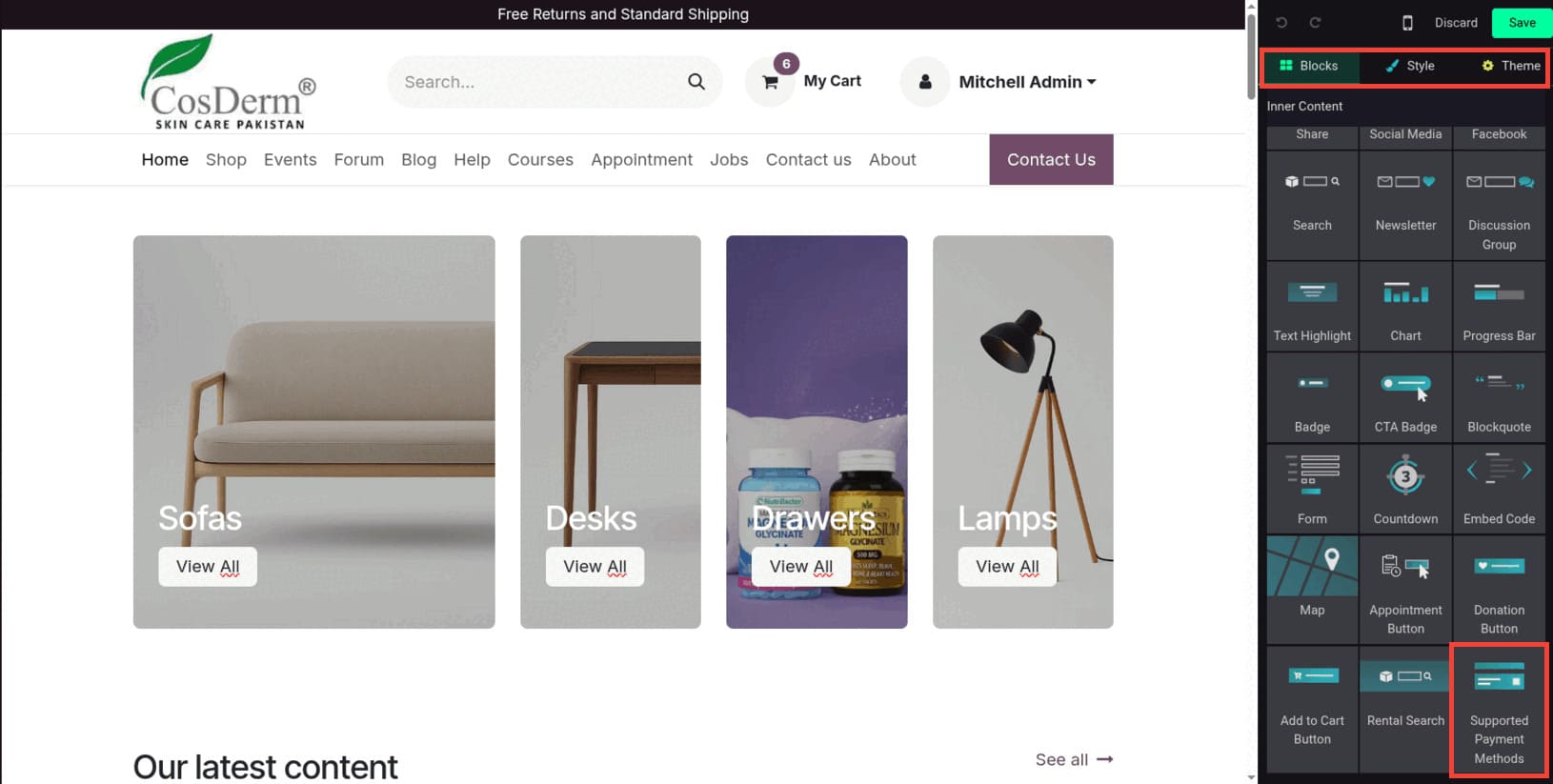
On top of that, website content management is now smoother than ever. With floating toolbars, improved text editing, and enhanced breadcrumb controls, editors can build and refine pages with greater speed and precision.
This combination of richer snippets and better editing tools ensures that both marketers and developers can deliver professional, user-friendly websites in less time.
3. Enhanced SEO tools
Odoo 19 strengthens its Website app with a suite of SEO and accessibility improvements designed to help businesses rank higher and provide a better user experience.
- Tools to automatically check and optimize your website for better search engine ranking and accessibility.
- Odoo 19 will also bring great improvements to SEO - from automatic SEO & accessibility checks to detailed insights, the new version will be ready to optimize your website ranking.
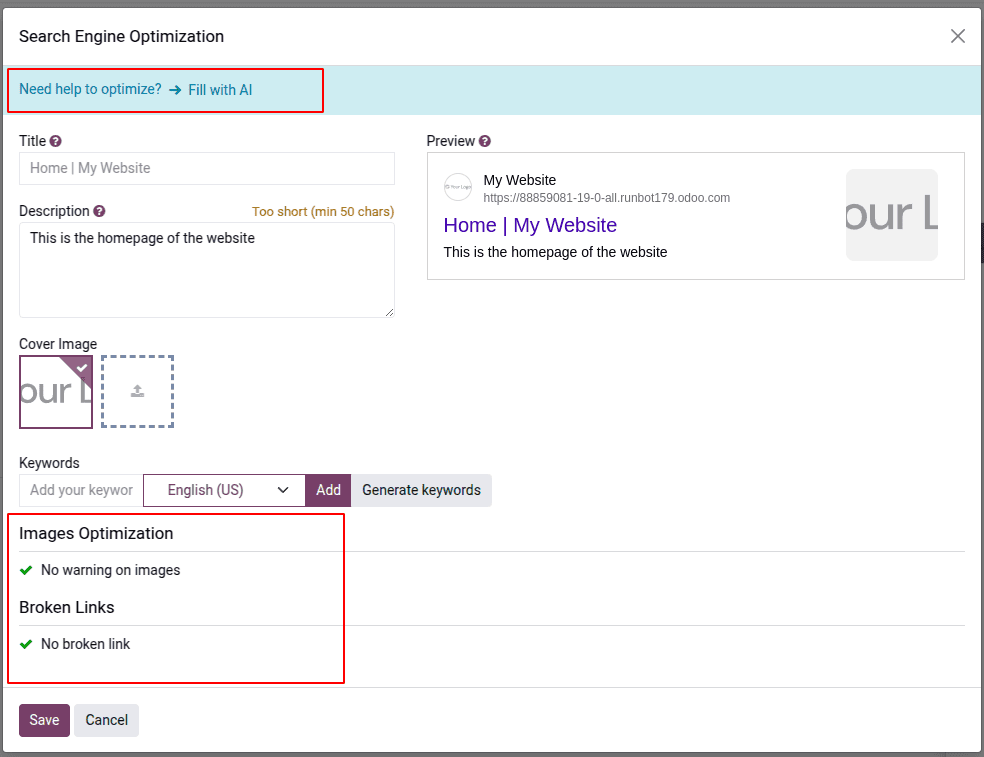
4. Improved Shopping Cart & Packaging Options
Odoo 19 enhances the shopping experience by allowing customers to choose packaging options directly from the shopping cart. This improvement is especially useful for businesses that offer products in different pack sizes, bundles, or eco-friendly packaging alternatives.
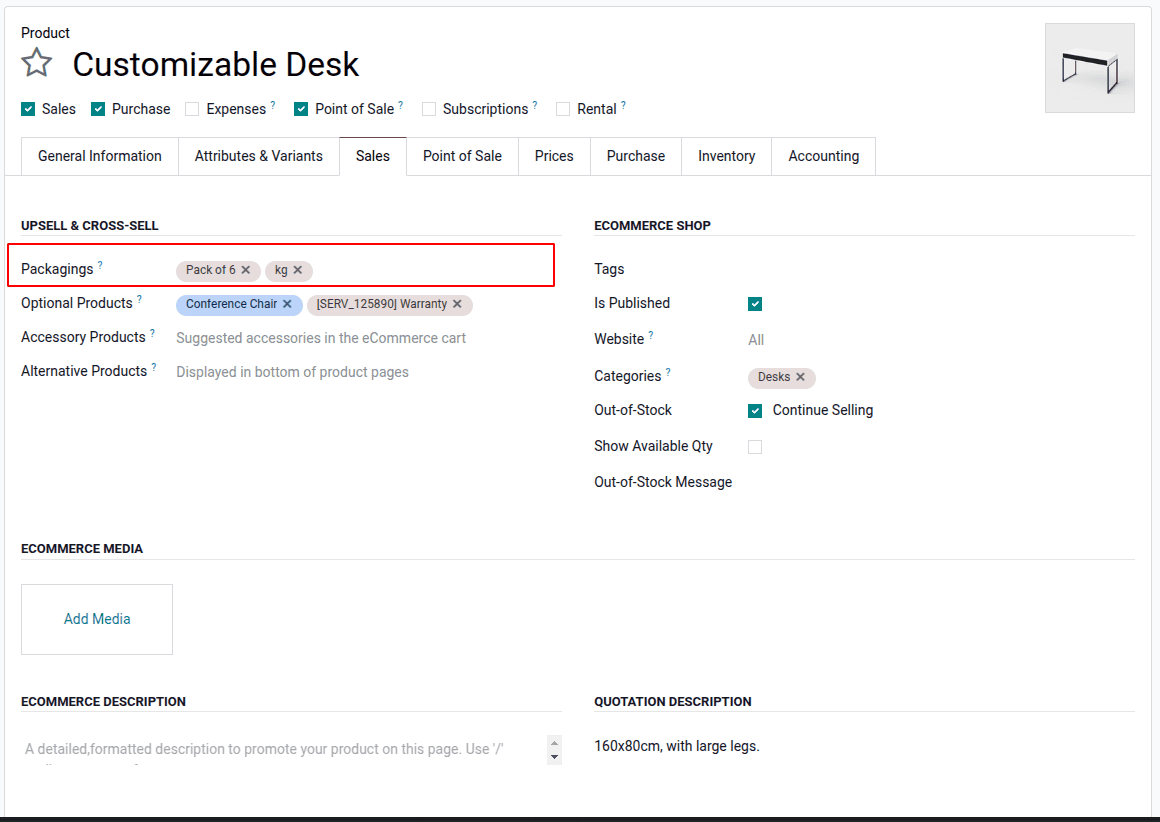
Once set, shoppers will be able to select their preferred packaging type while adding items to the cart or during checkout.
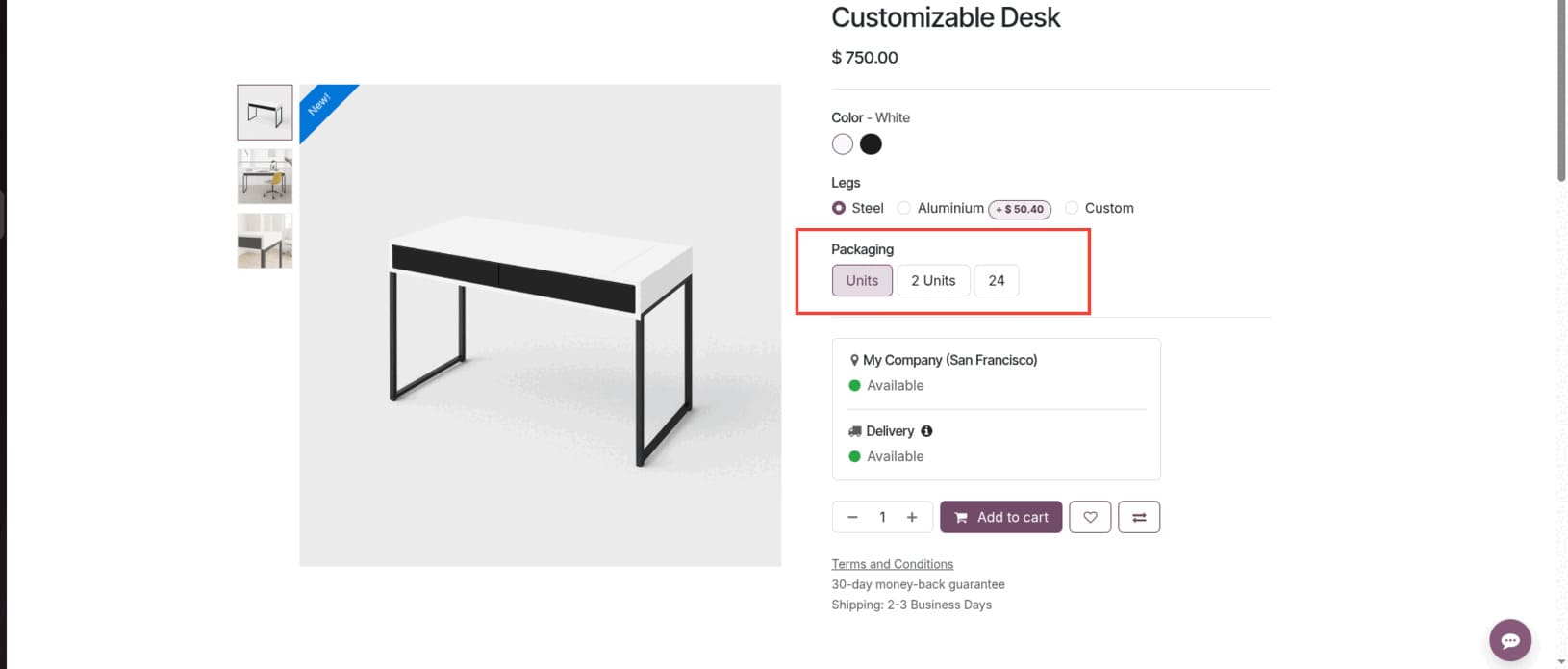
This feature makes online shopping more transparent and flexible, giving customers greater control over how they purchase while helping businesses promote sustainability or upsell through smart packaging choices.
5. Additional Website Improvements
- OWL Migration – The Website app is now powered by Odoo Web Library, delivering faster performance, smoother rendering, and compliance with modern web standards.
- Enhanced Blogs, Portals & Events – More customization options are available, allowing businesses to fine-tune layouts and present content more professionally.
- Standalone Event Pages – Events can now be created as independent pages, offering flexibility for campaigns, webinars, or promotional activities.
The Website module in Odoo 19 is designed with a clear focus on flexibility, usability, and performance. From dynamic ribbons and packaging options to richer snippets, SEO tools, and OWL-driven speed improvements, businesses now have everything they need to build engaging, optimized, and professional websites, without depending on third-party tools or heavy customization.
E-commerce
Odoo 19 brings a major refresh to the eCommerce app, focusing on better design, smoother shopping experiences, and stronger integrations. From storefront layouts to checkout flow and SEO, everything has been reworked to give both businesses and customers a more modern, efficient online store. The key improvements in the e-commerce modules are the following:
1. Attractive Layout
Odoo 19 introduces a fresh design experience for online stores with new layout options for shop pages, modernized product pages, and fully responsive themes.
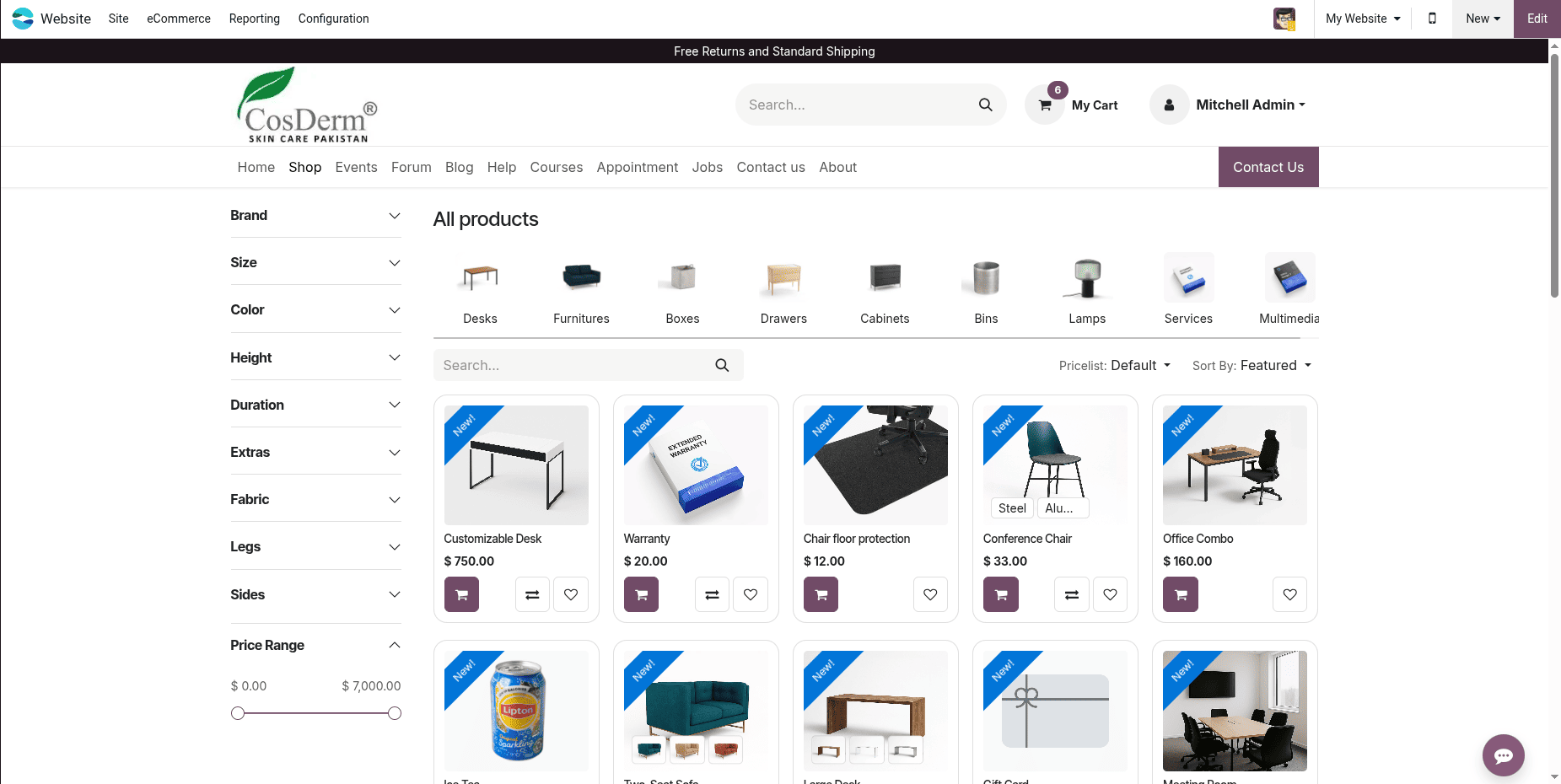
These updates make storefronts look more polished, user-friendly, and appealing across all devices, helping businesses deliver a professional shopping experience.
2. Smarter Checkout Flow
One of the most practical upgrades in Odoo 19’s eCommerce is the Unit of Measure (UoM) selector. This allows customers to choose how they want to purchase a product, for example, by unit, box, or weight, right from the shop page. It’s especially useful for businesses that sell in bulk or across multiple packaging options, giving shoppers flexibility without needing separate product listings.
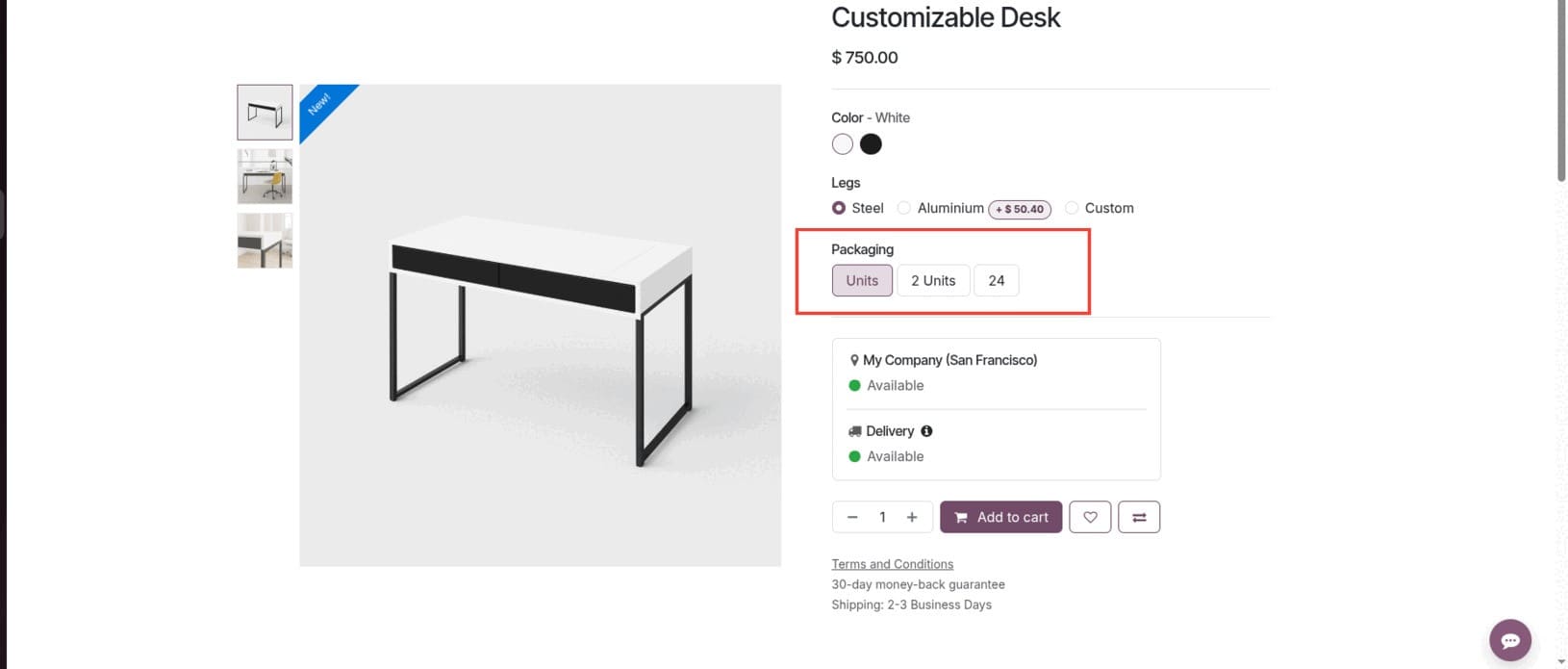
Customers now get a clearer and more intuitive interface when selecting pickup options. Whether they want home delivery or prefer to collect an order from the nearest store, the improved design makes the process faster and easier. This helps businesses that operate both online and offline provide a consistent, convenient shopping journey.
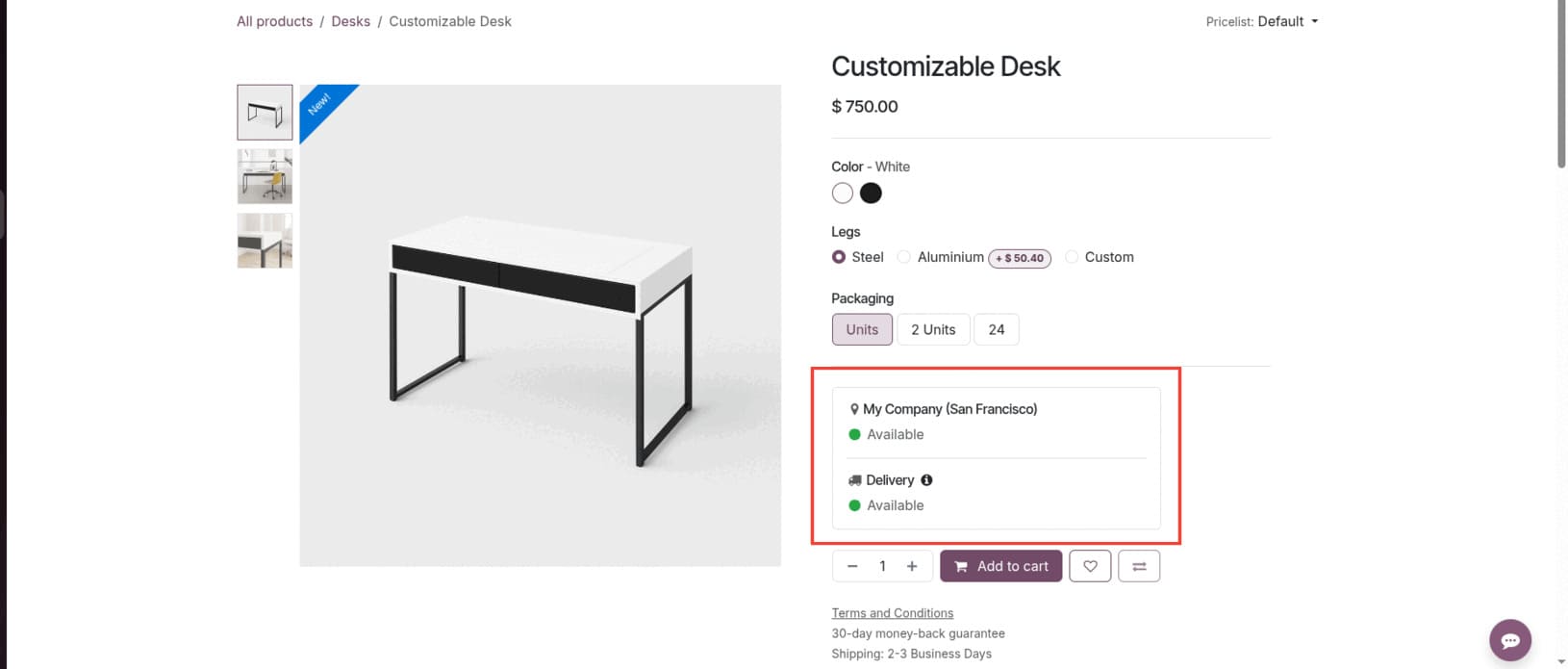
Instead of clicking into each product to see different colors, sizes, or configurations, customers can now explore variations instantly. This small but powerful change saves time, reduces extra clicks, and makes browsing far more engaging.
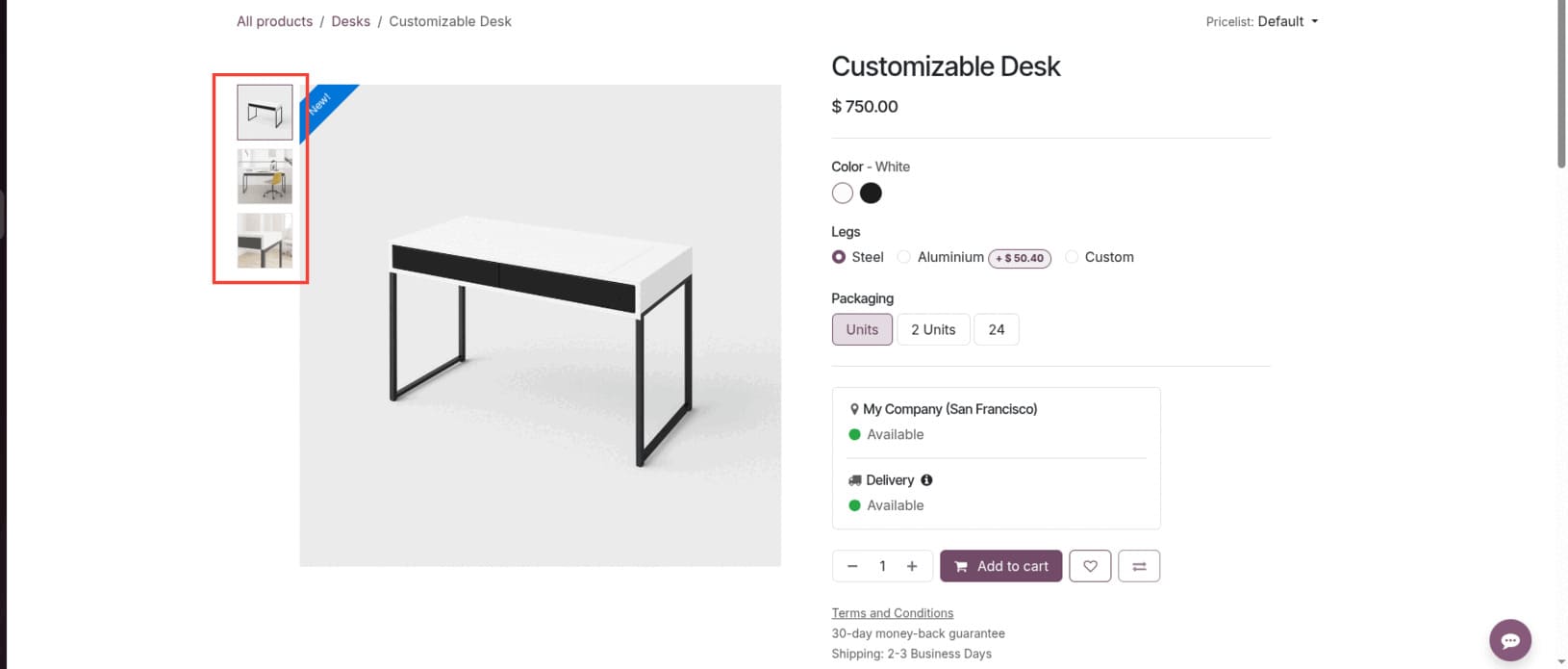
Together, these checkout enhancements create a smoother, smarter, and more customer-friendly workflow.
3. Google Merchant Center Integration
What is Google Merchant Center (GMC)?
Google Merchant Center is a platform where you upload your product catalog so your products can appear in:
- Google Shopping tab
- Google Ads campaigns (Shopping ads, Smart campaigns)
- Free product listings on Google
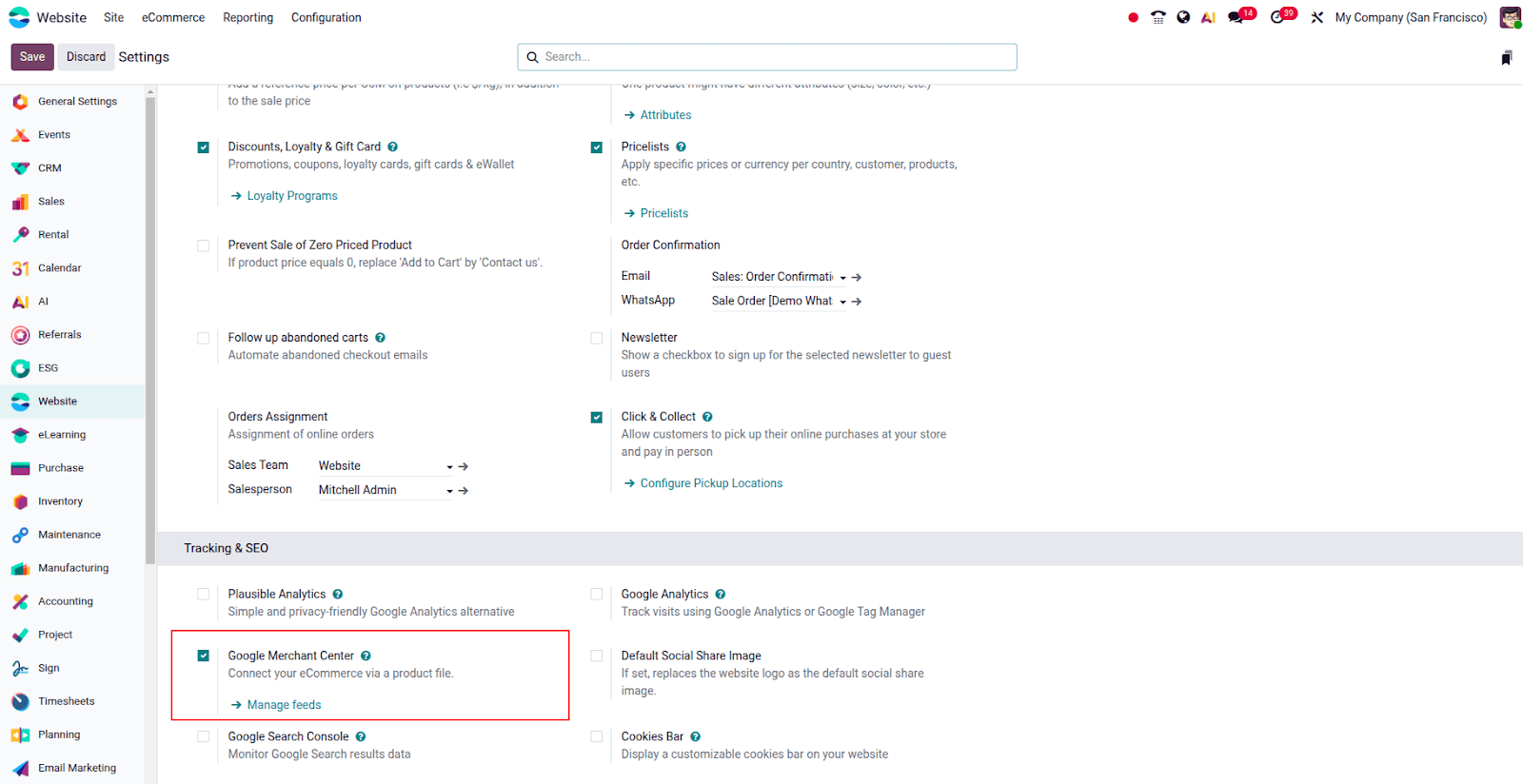
Benefits of Using this in the Odoo 19 Website
- Increased Visibility
- Your products appear in Google Shopping (free & paid).
- More exposure without extra effort.
- Automatic Sync
- Avoids mistakes of manual feed uploads.
- Odoo pushes real-time updates (price changes, stock availability).
- More Sales Channels
- You sell not only via your Odoo website but also through Google Shopping.
4. Import Your Website
Odoo 19 introduces the Website Import feature, enabling businesses to migrate an existing website simply by entering its URL. This eliminates the need to rebuild from scratch, saving both time and resources while ensuring a smooth transition.
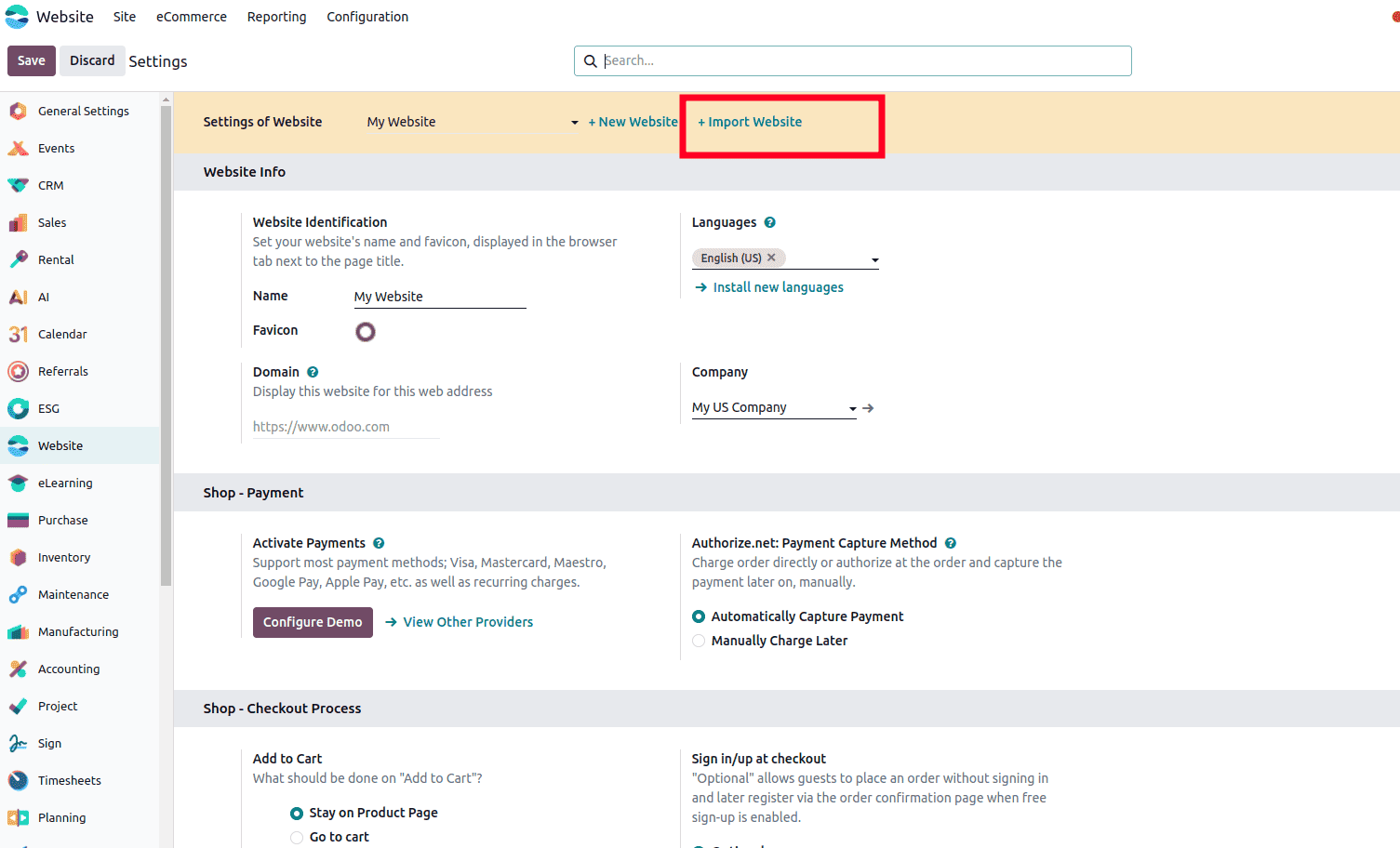
With this streamlined process, companies can quickly bring their online presence into Odoo, then focus on customization, eCommerce, and integration with their core business operations.
5. E-commerce Availability Upgrade
The latest Odoo 19 update introduces an exciting enhancement to its eCommerce platform with a new inventory panel, seamlessly integrating company location, availability status, and delivery options right beside the "Add to Cart" button.
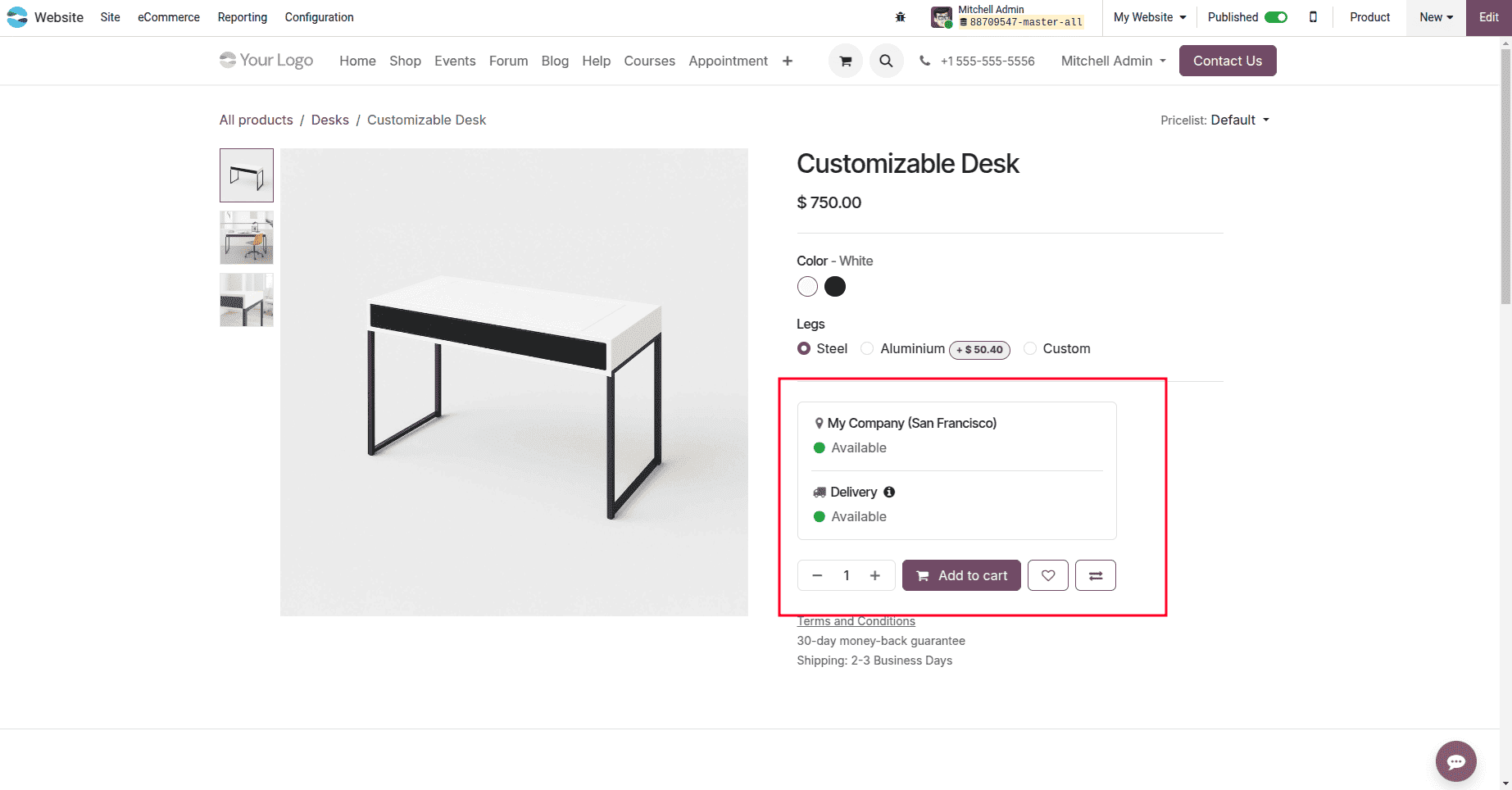
This feature matters because it provides customers with real-time, actionable insights, boosting trust and simplifying purchases, especially for businesses with multiple warehouses.
6. Improved Layouts & Filters
- Active Website Filter Display – The active website is now clearly visible in the Filters panel, reducing confusion when managing multiple sites.
- Quick Filter Removal – Filters can be removed with a single click, simplifying navigation and content adjustments.
Partnerships / Memberships
In Odoo 19, the former Members app has been rebranded as Partnerships / Memberships, reflecting a broader and more integrated approach to managing member and partner relationships. The update makes it easier for organizations, associations, and businesses to handle memberships, affiliations, and partnerships all within one unified module.

1. Affiliate Pages Builder
Odoo 19 introduces a brand-new Affiliate Pages Builder, giving users a complete website builder to create and edit affiliate pages directly within the system.
- Before (Odoo 18): There was no dedicated feature for affiliate page creation. Businesses had to design pages manually or depend on custom development.
- Now (Odoo 19): A built-in drag-and-drop editor makes it possible to design affiliate pages quickly, with ready-to-use elements and templates.
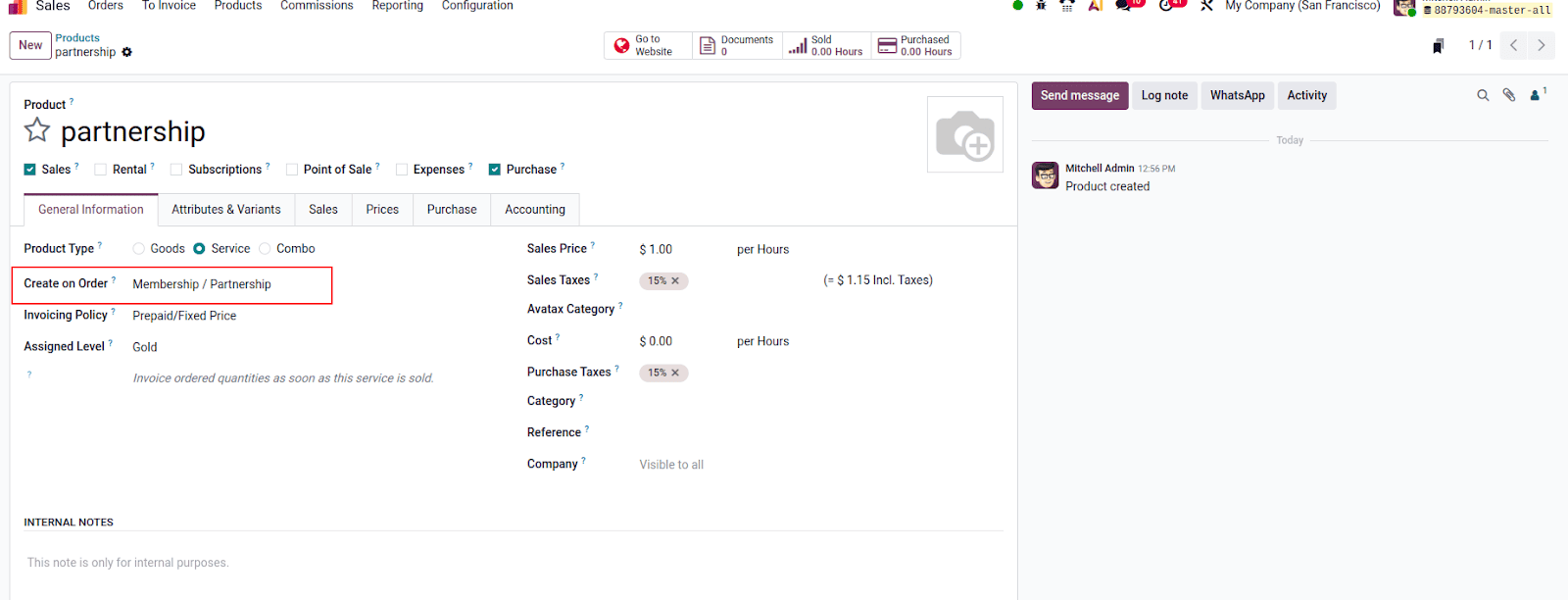
Example: A business can set up a professional affiliate landing page featuring banners, signup forms, links, and tracking elements, all without writing a single line of code.
With these updates, Odoo 19 makes partnership and membership management more seamless than ever.
Sales
In Odoo 19, the Sales apps receive major upgrades that give businesses more flexibility, better integrations, and smoother workflows. From controlling what customers see on quotations to connecting with new marketplaces, these updates help sales teams work smarter and present information more clearly.
1. Price & Product Visibility Control
In many industries, businesses don’t always want to reveal every detail of their pricing structure. Odoo 19 solves this by allowing you to hide product details, hide individual prices, or show only the subtotal on documents like quotations, purchase orders, and invoices.
This gives sales teams the flexibility to tailor how information is presented to different customers.
Example: Instead of showing a breakdown of every product cost, a company can send a quotation that lists only the subtotal. This keeps the focus on the overall deal while still maintaining transparency.
2. Payment Methods & Marketplaces
Getting paid is now easier with Odoo 19. The system adds support for new payment providers such as Nuvei, Paymob, DPO, Redsyn, and Iyzico, covering a wider range of global and local markets. On top of that, Odoo 19 integrates directly with popular online marketplaces like Shopee and Lazada, opening the door for businesses to expand into new regions without extra development work.
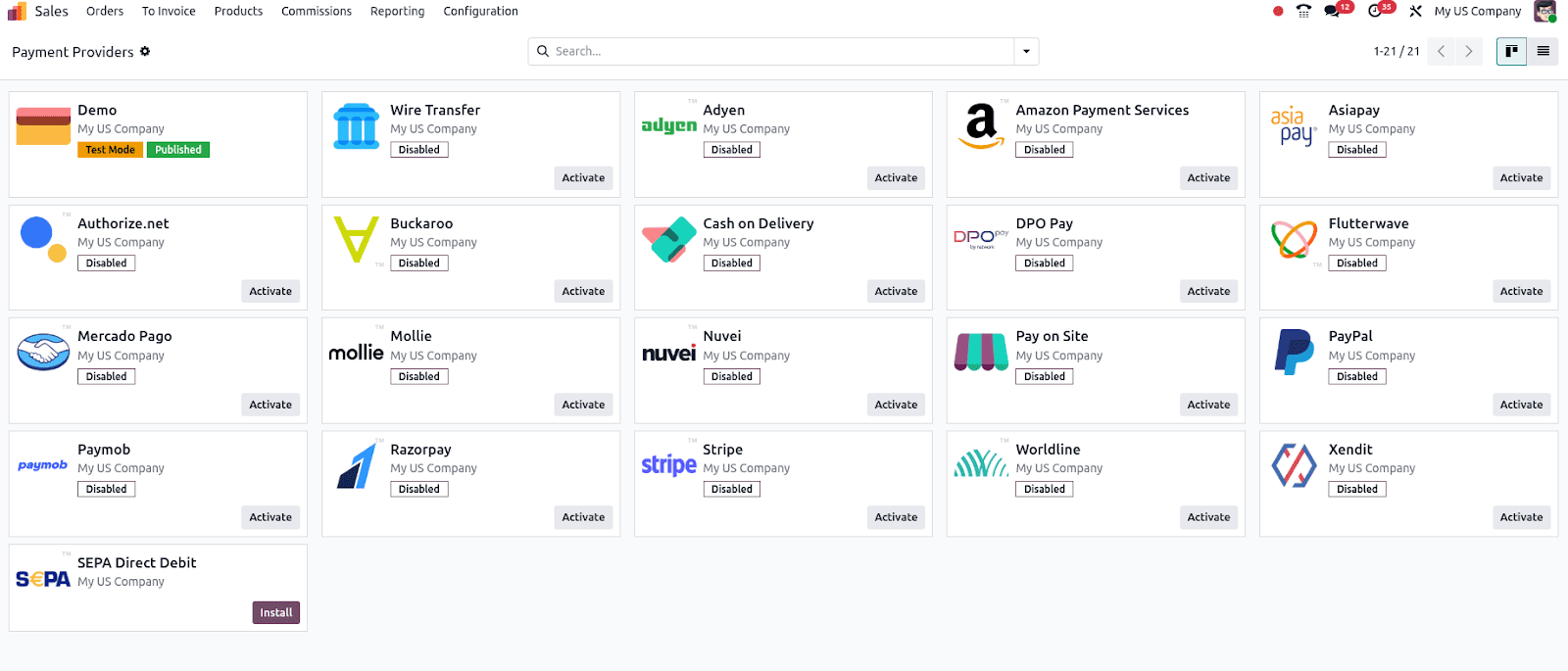
Example: A small shop in Asia can now sell its products on Lazada, giving it exposure to millions of buyers, and accept payments through local providers that customers already trust.
3. Sales Order Sections in Catalogs
Sales orders are now easier to read thanks to the ability to organize them into sections based on categories. This keeps documents clean and professional, especially when dealing with multiple product types.
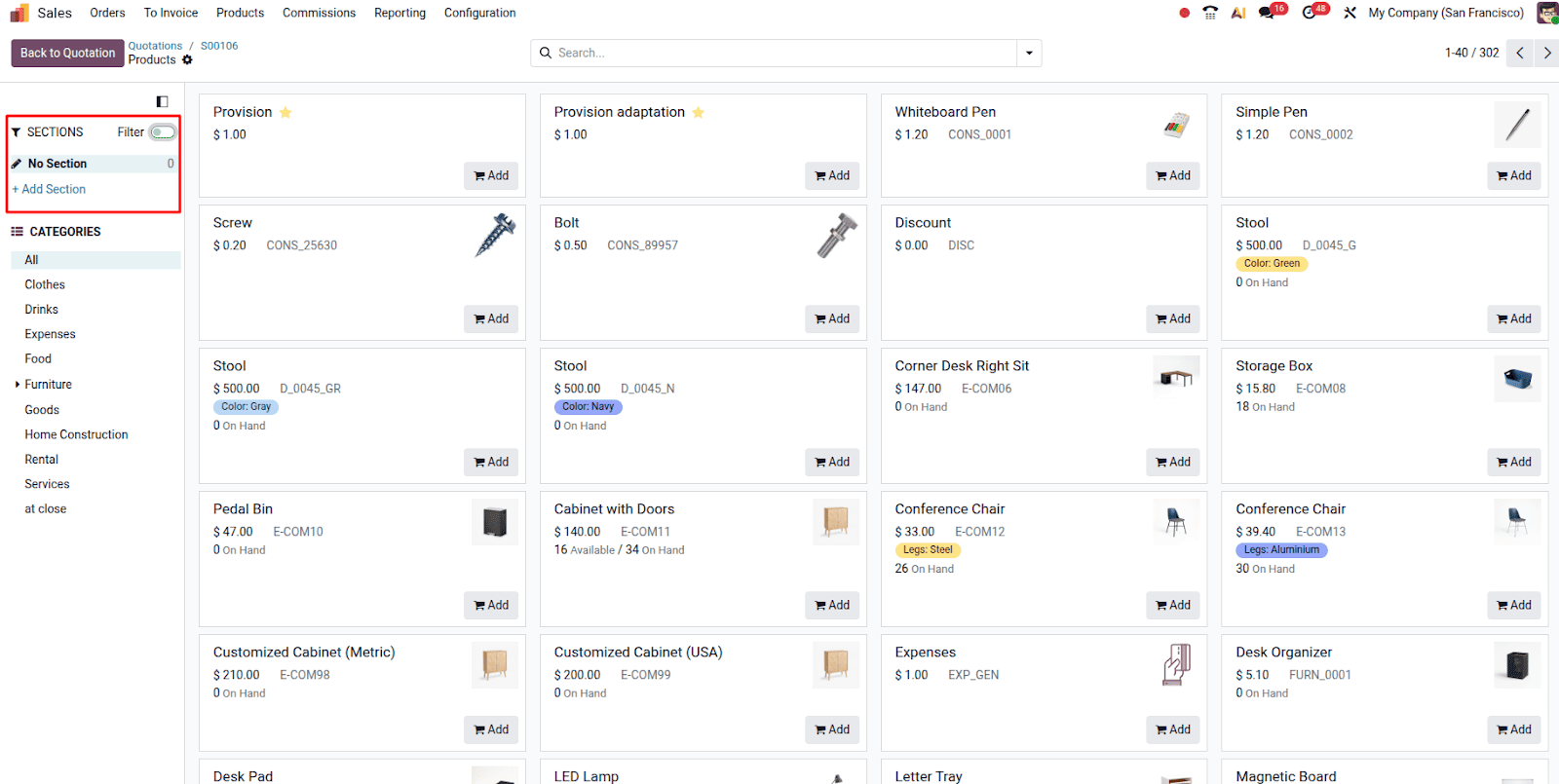
Example: A company selling electronics can automatically separate “Laptops,” “Accessories,” and “Maintenance Services” into distinct sections within a single quotation, instead of listing everything in one long table.
Point of Sale
Odoo 19 brings a major refresh to the Point of Sale app, focusing on usability and flexibility. From combo products and better dine-in management to a new dark mode and a cleaner interface, these changes make life easier for cashiers, servers, and business owners alike.
1. Combo Products with Flexible Options
For the first time, combo products are natively supported in POS. Businesses can now create and sell product bundles directly in the POS interface, with full control over settings such as:
- Maximum items allowed in a combo
- Free items included
- Special combo pricing
- Visibility across multiple companies

This makes managing meal deals, promotional packs, or service bundles much simpler compared to Odoo 18, where workarounds were needed.
2. Set Table and Rename Orders
In busy restaurants and cafés, smooth order handling is critical. With Odoo 19, staff can now directly assign orders to tables in the POS system, making dine-in management far more organized. No more juggling handwritten notes or remembering which group belongs where, everything is tracked in the system.
On top of that, orders can be renamed instantly. This is especially helpful for takeaways or special cases.
For example, staff can rename an order to “Parcel,” “Delivery,” or even “VIP Guest” without disrupting the flow of other orders. Together, these improvements bring clarity to order tracking, reduce mistakes, and make service faster.
3. Dark Mode
Long shifts behind a POS screen can strain the eyes, especially in environments with low lighting like bars, pubs, or late-night restaurants. Odoo 19 addresses this with a built-in Dark Mode option for the POS interface.
Dark Mode not only improves visual comfort but also creates a more modern, professional look at the counter. For businesses, it means happier staff and a system that adapts better to different working conditions. This small change can make a big difference in usability and overall user satisfaction.
4. UX Revamp
The POS interface has been redesigned based on real-world feedback, making it more intuitive and efficient. Users can now:
- Switch between presets quickly
- Handle combo products more smoothly
- Navigate a cleaner, more responsive interface
This upgrade makes day-to-day operations faster, especially during peak hours.
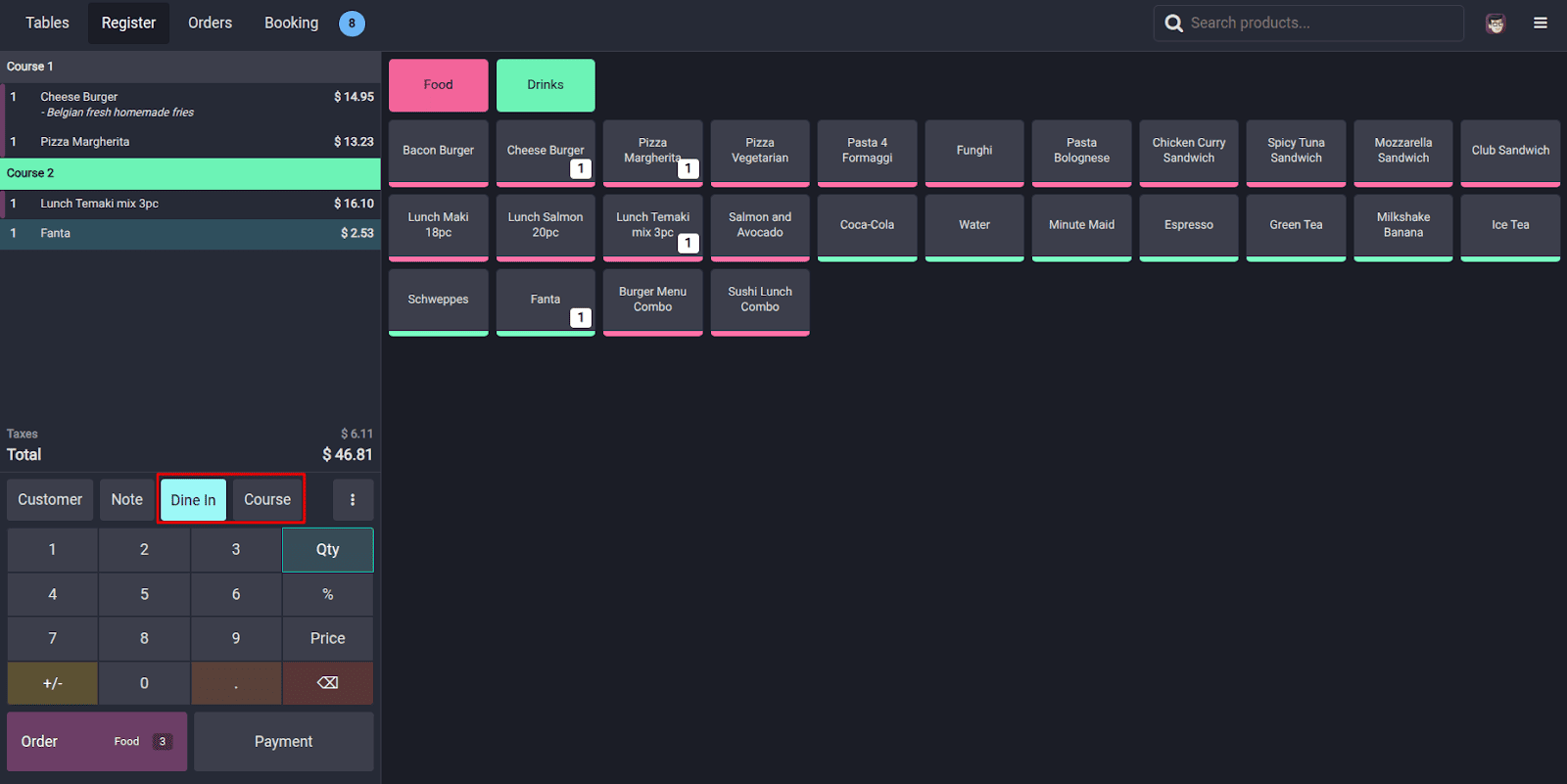
5. Table Number Selection
Managing dine-in orders often gets tricky when multiple tables are occupied at the same time. Odoo 19 solves this with a new “#” button in the POS interface, allowing staff to assign table numbers instantly and keep orders organized.
- Direct Table Assignment – Staff can select the correct table right from the POS, no need for manual notes.
- Better Accuracy – Each order is linked to the right table, reducing serving mistakes.
- Time-Saving – Quick table selection speeds up service during busy hours.
- Clearer Workflow – Servers and cashiers can track dine-in orders with less confusion.
This small but impactful update makes restaurant operations smoother and more reliable, especially during rush hours.
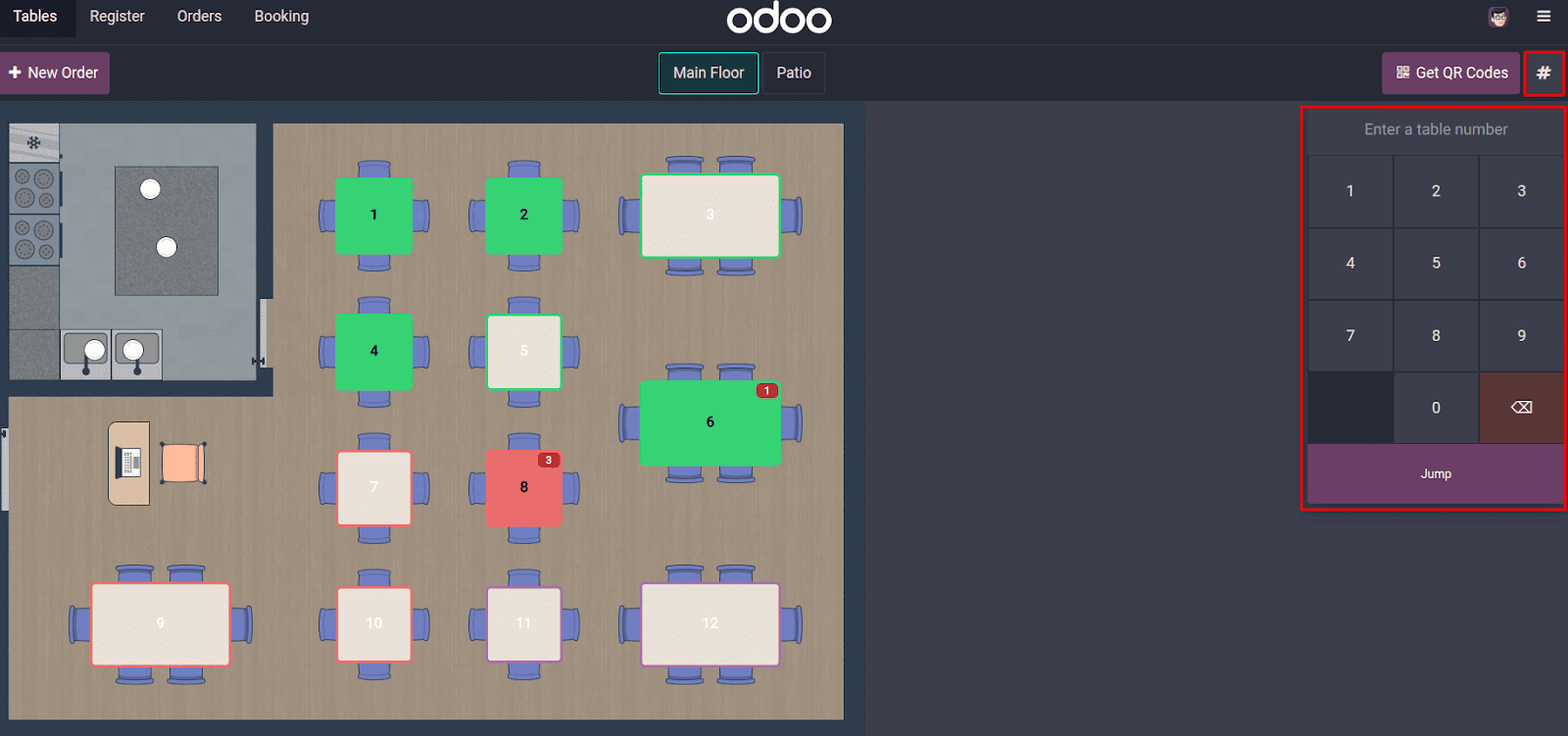
The new POS in Odoo 19 is simpler and more flexible. Features like combos, table settings, dark mode, and a cleaner design help shops and restaurants work faster and serve customers better.
Inventory and purchase
Odoo 19 brings big improvements to Inventory and Purchase, focusing on flexibility, accuracy, and ease of use. From managing units and packages to smarter order handling, these updates make warehouse and procurement processes smoother.
1. Unified Units of Measure & Packaging
- In Odoo 19, Units of Measure (UoM) and packaging are merged into a single, easier structure.
- You can now assign multiple purchase units and sales packaging to the same product.
- No need to deal with categories separately, reducing confusion. Example: A warehouse manager can buy items in boxes of 50 and sell them in single pieces, all managed under one product setup.
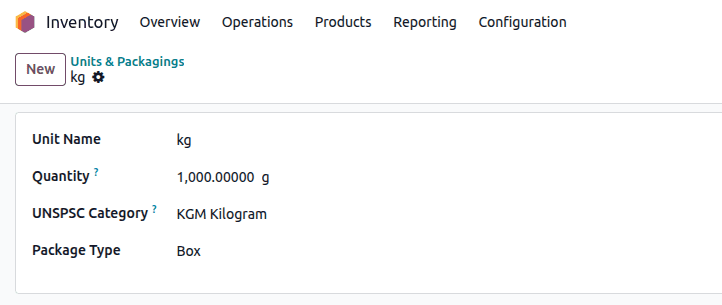
2. Multi-Level Packages
- Odoo 19 now supports packages within packages, making tracking much clearer.
- Each level can be tracked with Odoo-generated sequences or pre-printed roll numbers.
Example: A logistics team can track a pallet that contains boxes, which in turn contain individual items, all the way to delivery.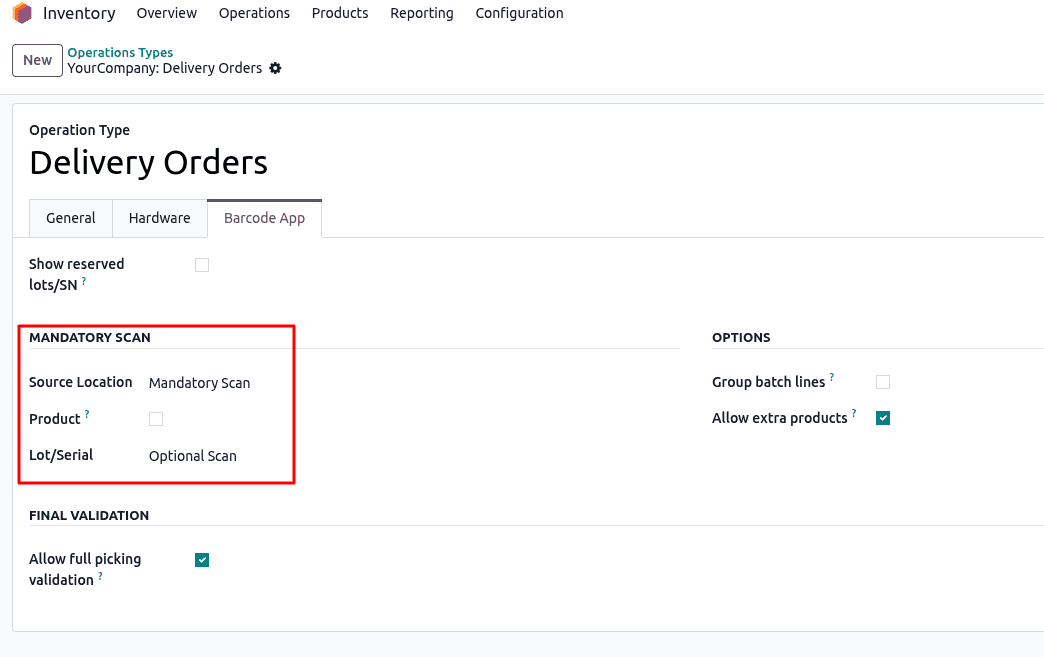
3. Make To Order (MTO)
In Odoo 19, the Make To Order (MTO) process has become much simpler and more user-friendly.
- Earlier in Odoo 18, MTO had to be configured product by product, which was time-consuming and prone to mistakes.
- Now, Odoo 19 introduces a single checkbox that lets you enable or disable MTO instantly.
- This means products will only be purchased or manufactured after a customer order is confirmed, instead of keeping unnecessary stock in your warehouse.
- It’s especially useful for businesses dealing with customized, rare, or high-value items where stocking in advance isn’t practical.

Example: A furniture company that sells custom dining tables doesn’t need to keep them in stock. With MTO turned on, once a customer places an order, Odoo automatically triggers either a purchase order for materials or a manufacturing order. This reduces inventory costs and ensures production aligns directly with customer demand.
HR & Payroll
Odoo 19 brings solid improvements to HR & Payroll, making it easier to manage employee contracts, time off, payroll records, and recruitment. The focus is on clarity, automation, and localisation, ensuring HR teams can handle people operations more efficiently.
1. New Structure for Employment Contracts
In Odoo 19, employee contracts are no longer scattered as separate records. Instead, they are stored as versions directly in the employee’s profile.
- Every time there’s a change (like salary updates, promotions, or new positions), Odoo automatically creates a new version.
- HR can then see the full timeline of an employee’s career development inside the company.
Example: If an employee joins as a “Junior Developer” and later becomes a “Team Lead” with higher pay, Odoo 19 keeps both records under the same profile, showing a clear history without manual tracking.
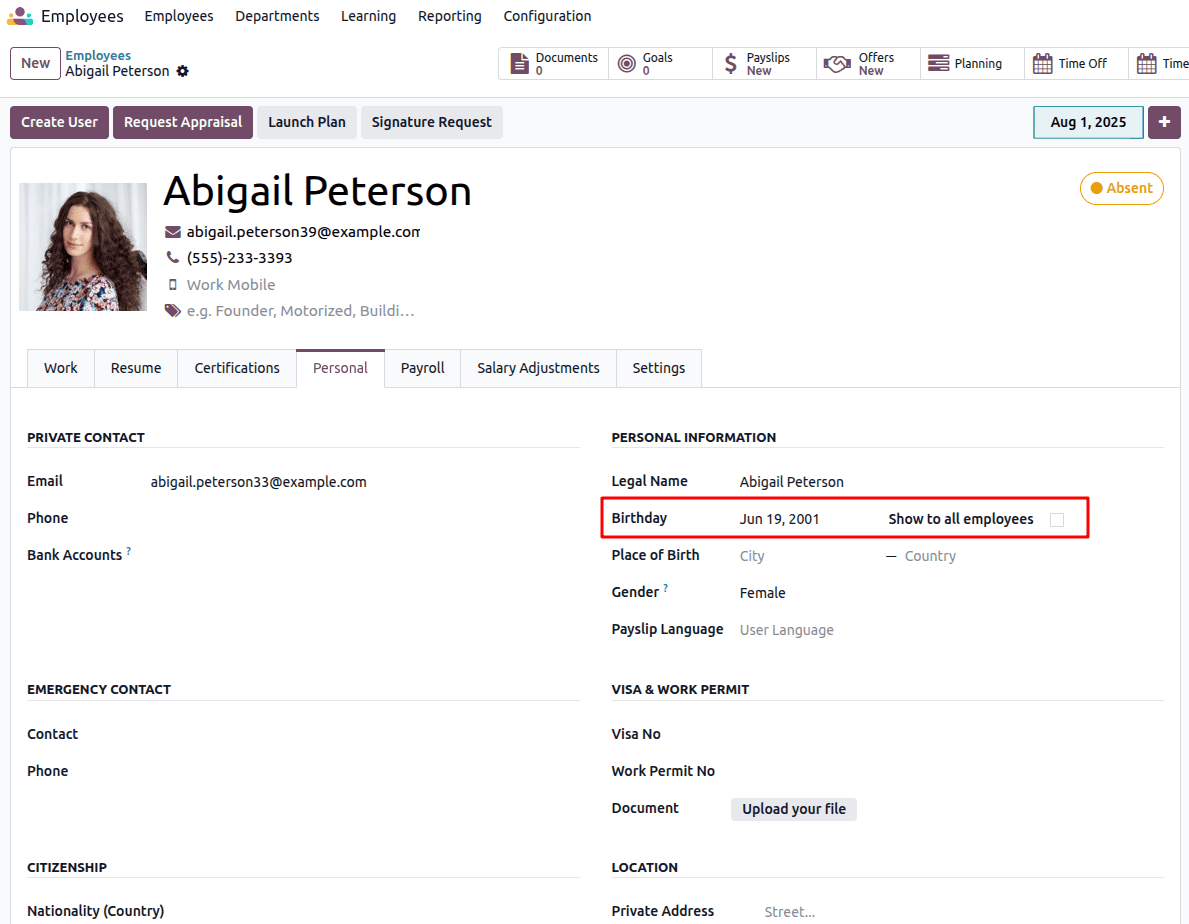
2. Time off Revamp
The Time Off module now has a fresh user interface and smarter features.
- Public holidays are fully supported, so HR doesn’t have to adjust balances manually.
- Employees can request overlapping time off entries, and the system handles it neatly.
- Localised data is available even without payroll enabled, making it useful for global teams.
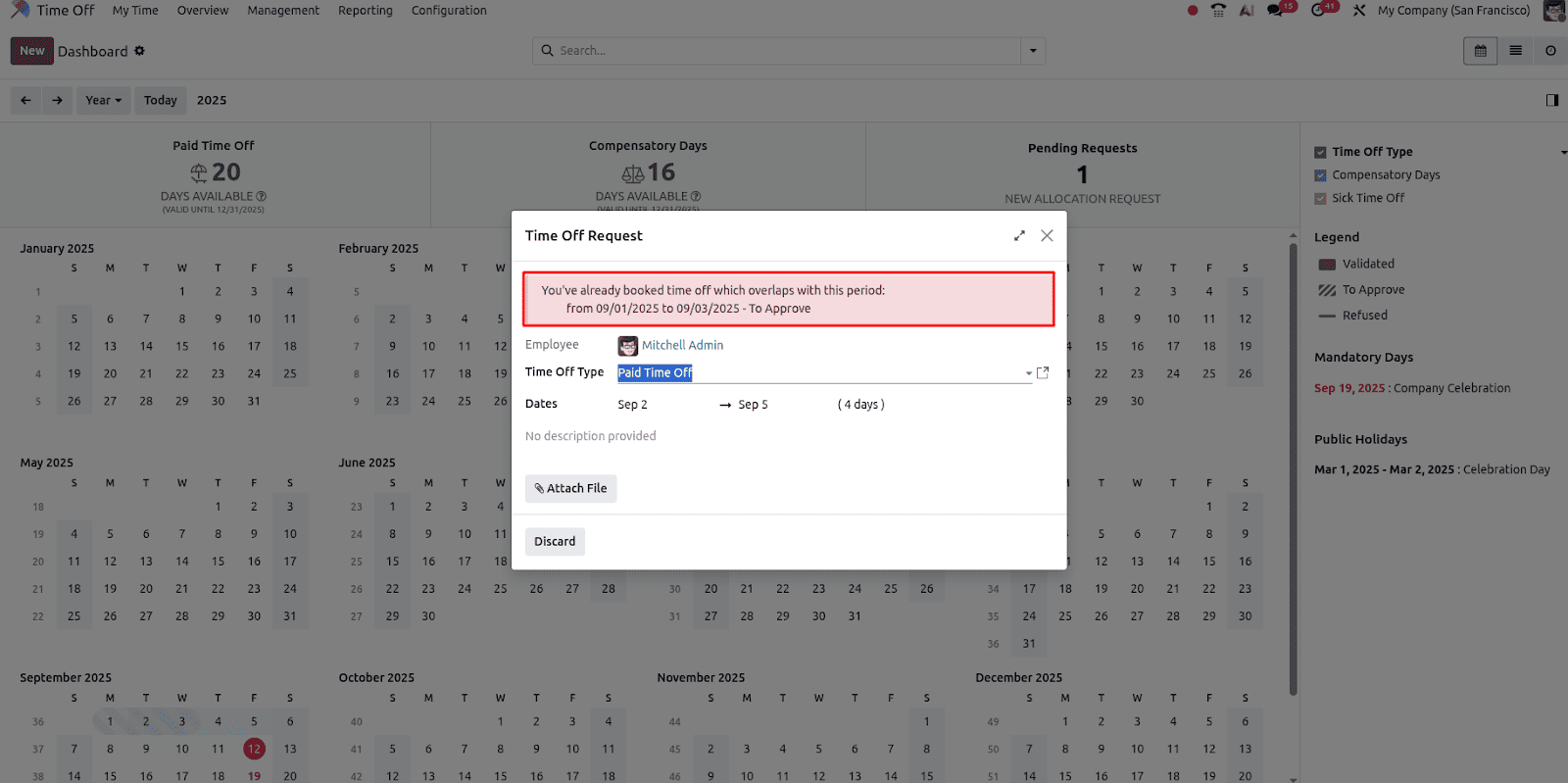
This upgrade simplifies leave planning and ensures smoother coordination between managers and employees.
3. Payroll Enhancements
Payroll in Odoo 19 benefits from tighter integration with employee records.
- Contracts and employee details are now merged, meaning no more jumping between separate screens.
- The system maintains a full history of payroll changes, making audits and reviews much easier.
Example: A payroll manager can instantly view salary adjustments, past contracts, and employee records in one place, reducing errors and saving time.
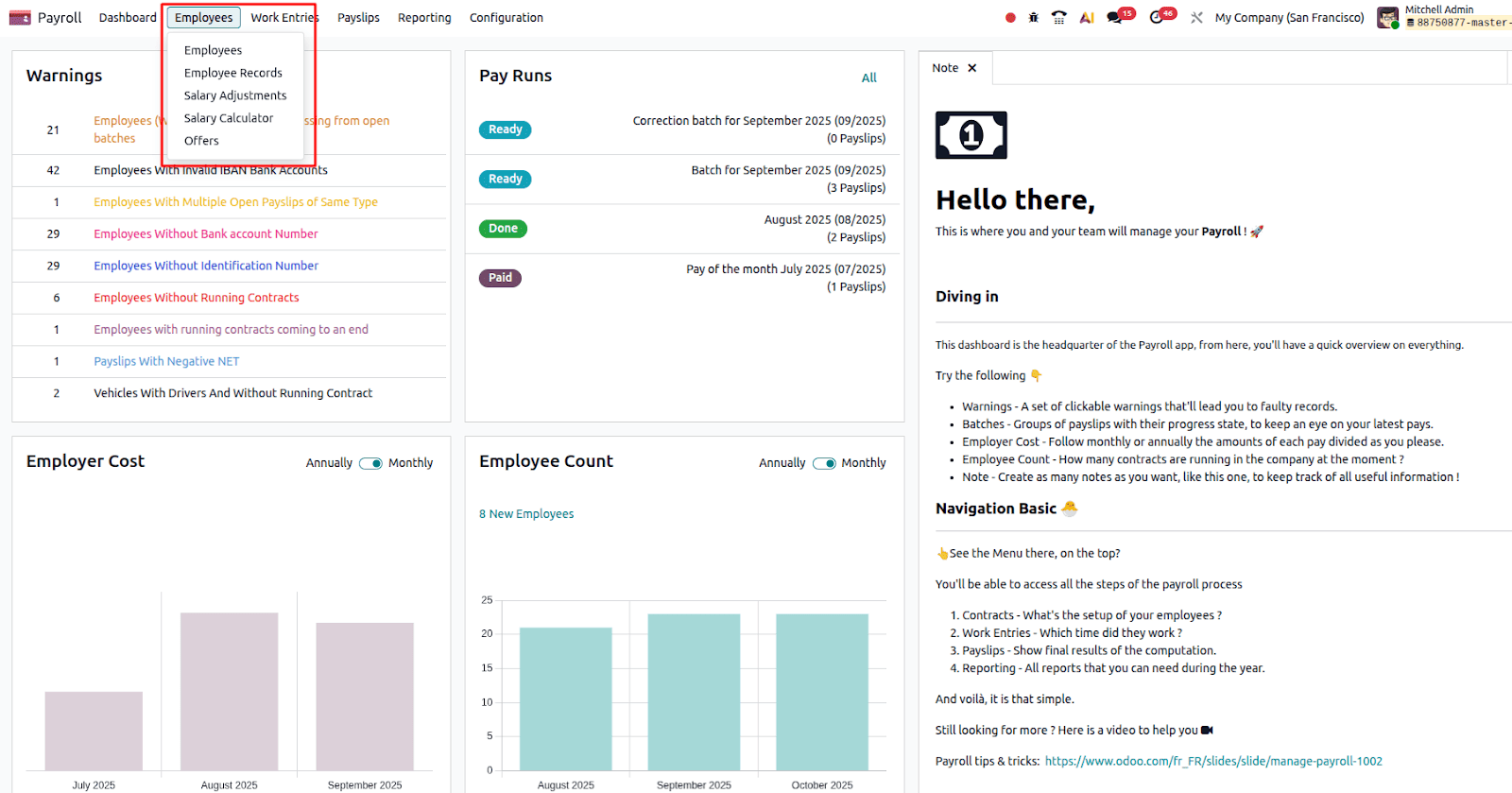
4. Talent Pool
Recruitment in Odoo 19 gets smarter with the introduction of Talent Pools. Instead of viewing candidates only by job positions, HR teams can now organize applicants into groups based on skills, experience, education, or role suitability.
- This allows companies to build a long-term database of potential hires, not just for current job openings but also for future needs.
- Hiring managers can easily search, filter, and shortlist from these pools, saving time when a new vacancy comes up.
- Talent Pools also improve collaboration, as recruiters can share candidate groups internally with hiring teams.

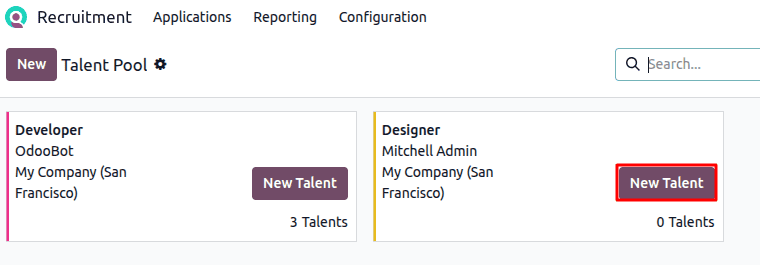
Example: A company hiring for a “Data Analyst” role can build a pool of candidates with Python, SQL, and data visualization skills. Even if some aren’t hired immediately, HR can revisit the same pool later when a new analytics role opens, without starting the search from scratch.
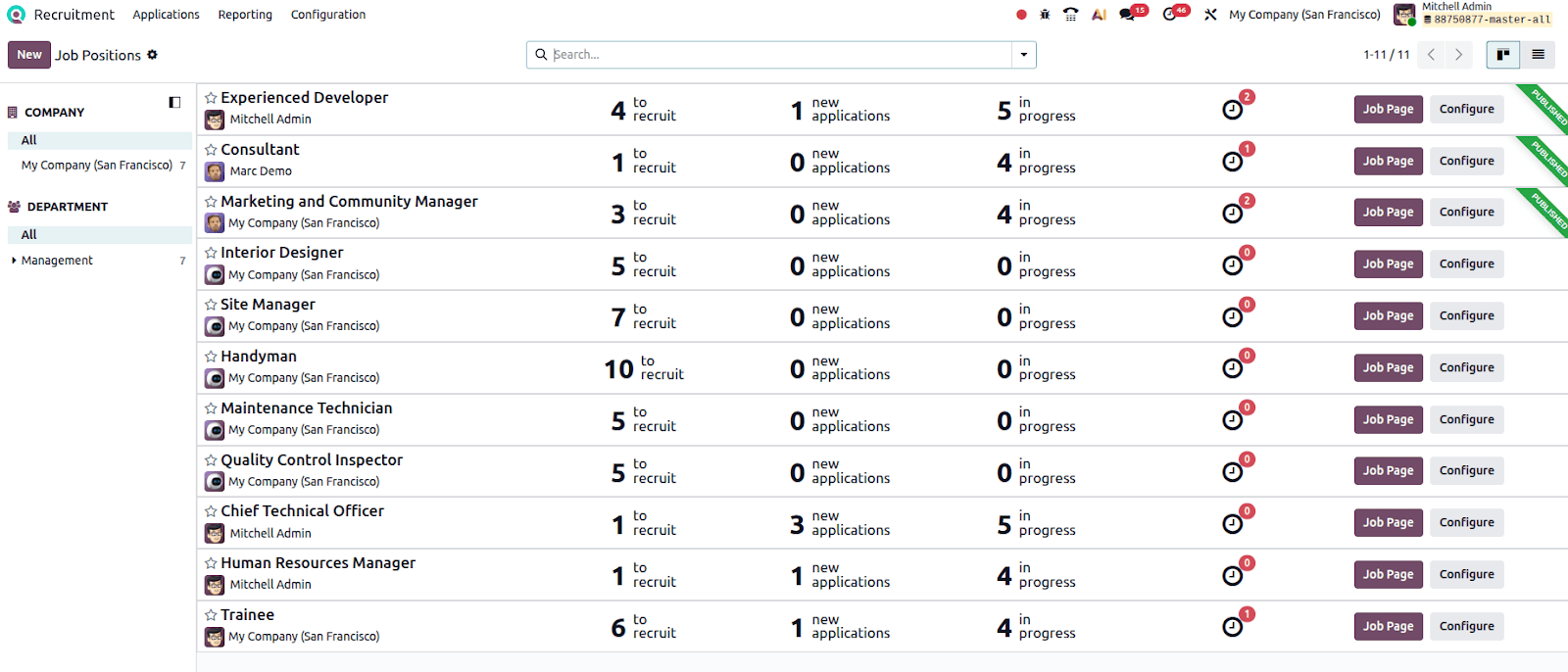
Accounting
Odoo 19 makes accounting smoother and more reliable with better tax handling, easier reconciliation, stronger invoicing tools, and wider localisation support. These updates aim to save time for accountants and make compliance easier across different countries.
Here’s what’s new:
1. Tax Return Timelines & Validation
Odoo 19 introduces tax return timelines to keep track of all tax reporting deadlines. Now, accountants can see exactly when tax returns are due, reducing missed deadlines and last-minute work.
- Validation checks automatically flag mistakes in your tax calculations before submission.
- Localisation ensures that the system adapts to country-specific tax rules and formats.
- Historical timelines allow accountants to review previous returns and audit compliance.
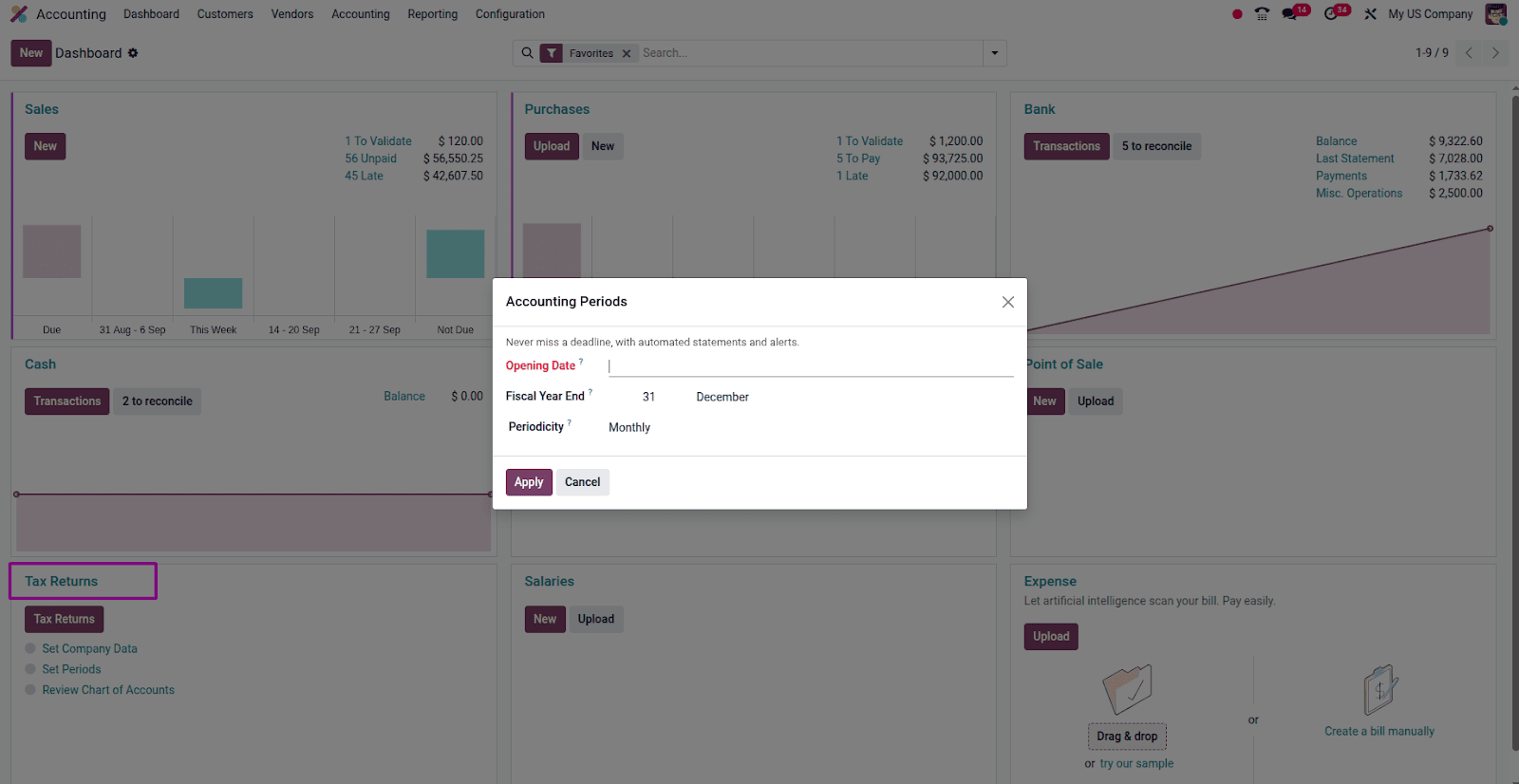
Example: An accountant preparing VAT for multiple clients can now see all deadlines, check for errors automatically, and submit tax returns without manually calculating or double-checking figures.
2. Bank Reconciliation (Mobile-Friendly)
Bank reconciliation has been completely revamped in Odoo 19 to improve usability and accessibility.
- The interface is cleaner and more intuitive, helping accountants match bank statements with invoices faster.
- Now mobile-friendly, users can reconcile payments on smartphones or tablets, not just desktops.
- Automatic suggestions highlight unmatched transactions, reducing manual work.
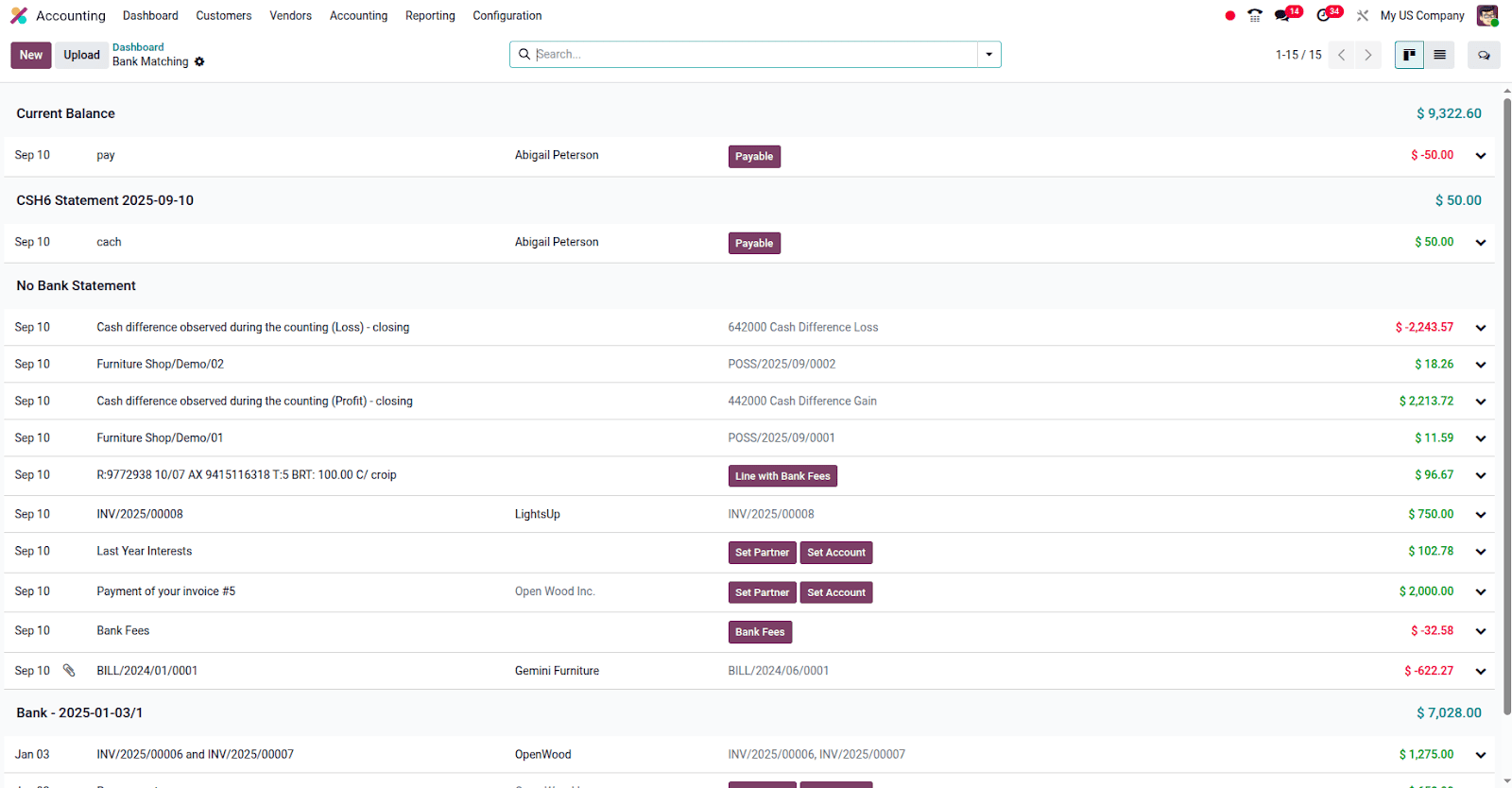
3. Invoicing Optimisations
Odoo 19 makes invoicing smarter and more automated.
- Follow-up actions: Automatic reminders can be sent for overdue invoices.
- Aged reports: Quickly view outstanding invoices per customer or period.
- Bank sync: Payments are matched automatically with invoices.
- Private-use expense handling: Easier tracking of personal vs business expenses.
- PEPPOL integration: Enables seamless electronic invoicing in Europe for compliance.
Example: A company can automatically send invoices to clients, track unpaid bills, and generate reports, reducing errors and speeding up cash flow management.
4. Banking Enhancements
Odoo 19 makes banking smarter and easier for companies operating locally and globally. Setting up a new bank account is now much simpler and can be done within minutes, saving time for finance teams.
- Integration with Ponto, allowing users to initiate payments directly from Odoo without switching platforms.
- Improved SEPA workflows for smoother transactions across Europe, reducing manual errors.
- Broader bank synchronization, supporting multiple banks, accounts, and currencies in one system.
With these updates, finance teams can manage payments to vendors in different countries seamlessly, reducing errors and improving operational efficiency.
5. Reporting Improvements
Reporting in Odoo 19 is more professional and user-friendly. A new reporting engine ensures that even large datasets generate quickly, helping accountants stay productive. PDF layouts have been redesigned for clarity and polish, making them suitable for sharing with management, auditors, or stakeholders.
- Quick generation of annual statements and customer statements, saving time on routine reports.
- A lighter audit trail that tracks changes without overwhelming the system, ensuring accountability and traceability.
These improvements allow accountants to produce ready-to-share financial statements efficiently, maintaining accuracy while reducing manual formatting and effort.
6. Global Localization
Odoo 19 expands localization support to over 50 countries, making it easier for businesses to remain compliant with local regulations. The system automatically adapts to different tax rules, invoice formats, and reporting requirements for each country.
- Unified workflows for companies operating in multiple countries from a single Odoo instance.
- Automatic updates to reflect changes in local laws, reducing the risk of errors or non-compliance.
This global coverage ensures that multinational companies can generate legally compliant invoices, tax reports, and financial statements in every country they operate, without needing to manually adjust settings for each location.
Odoo 19 makes accounting easier, faster, and more reliable. With improved banking, reporting, and global localisation, finance teams can manage transactions, track finances, and stay compliant without extra effort. These updates help businesses save time, reduce errors, and focus on growth.
Expenses
Odoo 19 makes managing business expenses faster and more controlled. Employees can use virtual or physical expense cards for purchases, and managers can monitor spending in real time. This reduces manual reporting, speeds up approvals, and enforces company policies.
Virtual & Physical Expense Cards
Odoo 19 makes expense management smoother by introducing both virtual and physical expense cards. Employees no longer need to collect receipts and submit manual expense reports, purchases are recorded automatically.
Key benefits include:
- Direct Payments: Employees can pay for business-related items using the cards, whether online or in-store.
- Real-Time Tracking: Managers can monitor spending instantly, ensuring that all expenses follow company policies.
- Quick Approvals: Expenses can be approved or rejected with just a few clicks, reducing delays in reporting.
- Automated Reporting: All transactions are automatically recorded in the system, simplifying workflows for payroll and accounting teams and reducing errors caused by manual entry.
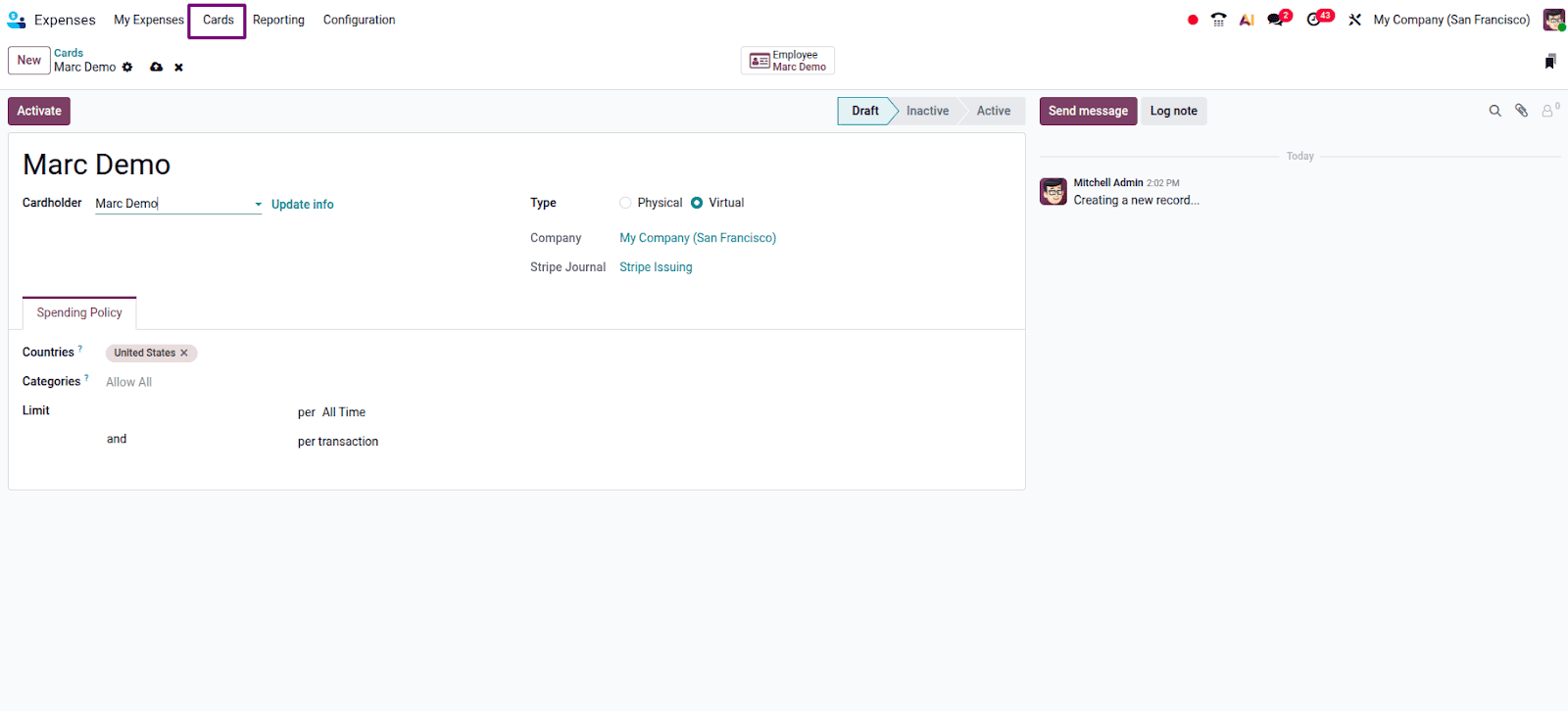
Example: An employee buys office supplies using a virtual card. The expense appears immediately in Odoo, where the manager can review and approve it. Once approved, it’s automatically included in payroll or accounting, eliminating extra paperwork and saving time for everyone.
Dashboards
Odoo 19 dashboards are redesigned to be faster, smoother, and more powerful, giving users better insights and making decision-making easier. The new features improve performance, filtering, and comparison, even with large amounts of data.
1. Faster Loading and Smoother Performance
Odoo 19 dashboards are now optimized for speed, ensuring users can access and interact with them without delays, even when working with large datasets or complex visualizations. This makes daily analysis much more efficient and frustration-free.
- Quick Access: Dashboards load faster than before, reducing wait times for users.
- Seamless Interaction: Scrolling, filtering, and drilling into data is smooth, even with thousands of records.
- Improved Productivity: Users spend less time waiting for dashboards to refresh and more time making data-driven decisions.
Example: A financial controller tracking thousands of invoices can open the revenue dashboard instantly and analyze data without experiencing slowdowns.
2. New Date Filter Panel
The new advanced date filter panel in Odoo 19 lets users perform detailed time-based comparisons more easily, helping teams spot trends and make informed decisions quickly.
- Flexible Comparison: Compare different periods, such as month-over-month or year-over-year.
- User-Friendly: A clean, intuitive interface makes it easy to set and adjust date filters.
- Enhanced Analysis: Quickly identify trends, seasonality, or anomalies across different time frames.
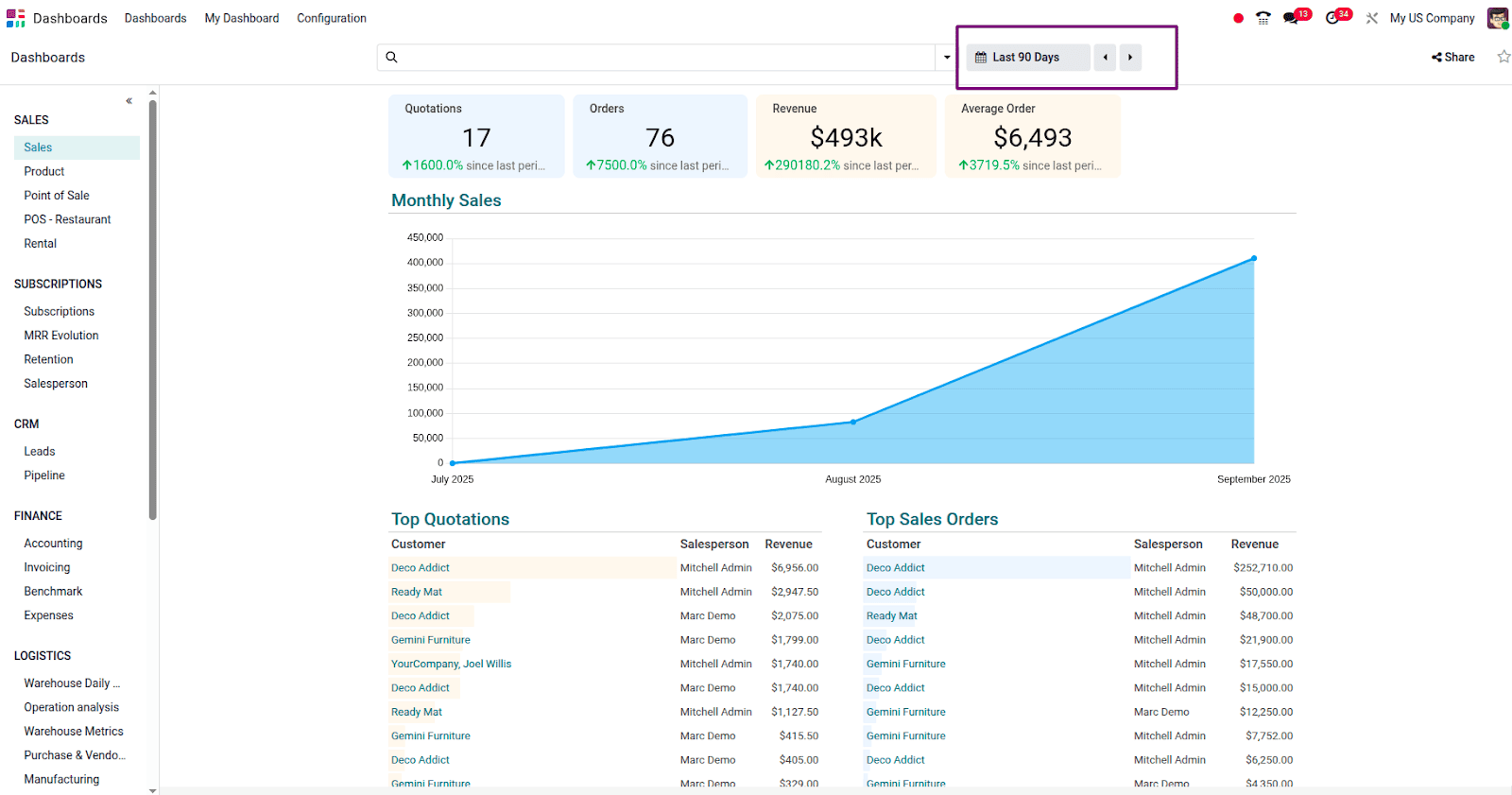
Example: A sales manager can compare Q2 2024 vs Q2 2023 directly in the dashboard with just a few clicks, saving time and simplifying reporting.
Spreadsheets
Odoo 19 transforms its Spreadsheet app into a more powerful tool for reporting and data analysis. With new chart types, geographic visualizations, funnel tracking, and advanced formulas, users can gain insights faster and present data more effectively.
1. Tree Map & Sunburst Charts
These new chart types make hierarchical data easier to understand and visually appealing.
- You can display multiple levels of data in one chart, allowing quick insights into complex datasets.
- Interactive features let you drill down into categories or subcategories.
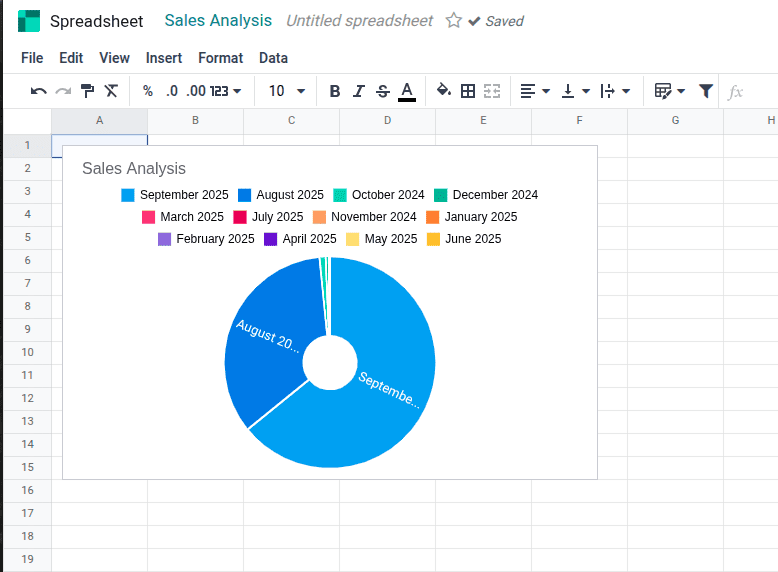
Example: A retailer can use a Tree Map to see sales performance by product category and subcategory at a glance, quickly spotting which categories are underperforming or excelling.
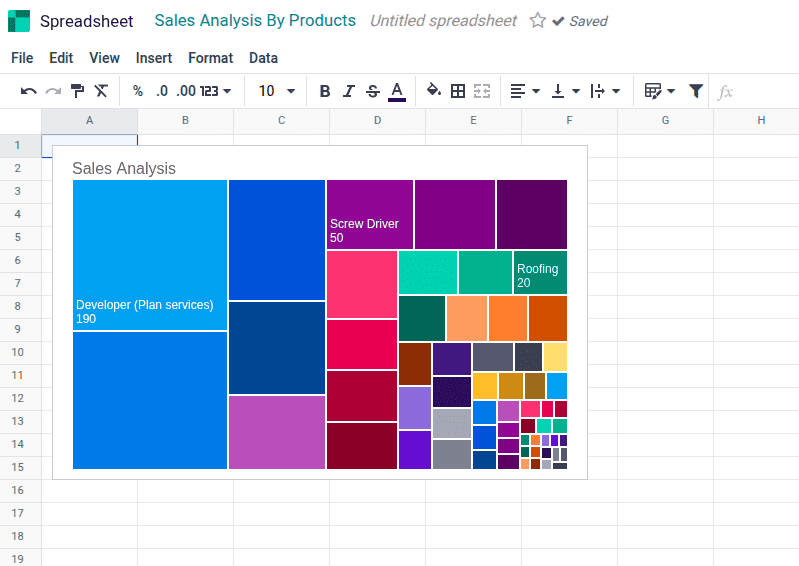
2. Geo Chart Visualization
Geo Charts provide a geographic view of your data, mapping information by regions or countries.
- Helps identify location-based trends, customer concentrations, or supply chain patterns.
Example: A logistics company can plot deliveries by country or region, instantly highlighting areas with high demand or delayed shipments. This makes planning routes and allocating resources much easier.
3. Funnel Chart Visualization
Funnel Charts help track conversions and monitor progress through multiple stages.
- Perfect for visualizing sales pipelines, recruitment processes, or project workflows.
Example: A sales manager can see how 1,000 leads filter down to 200 opportunities and finally 50 closed deals, helping to identify bottlenecks and optimize the sales process.
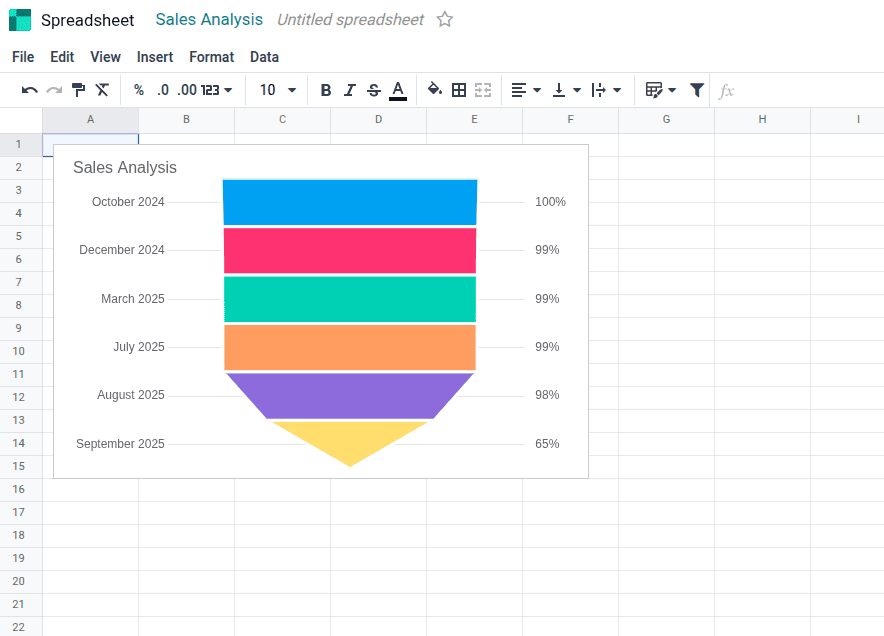
Funnel Charts provide a clear view of how leads or processes progress through stages.
4. New Formulas
Odoo 19 adds advanced formulas that simplify calculations and reporting.
- Supports aggregation, conditional calculations, and complex data analysis directly in the spreadsheet.
- Can automatically update results when source data changes, saving time and reducing errors.
Example: Finance teams can compute profit margins across multiple departments or product lines automatically, allowing faster decision-making and accurate reporting without extra manual work.
With these enhancements, the Spreadsheet app becomes a central tool for both analysis and presentation, giving businesses the flexibility to turn raw data into actionable insights quickly and effectively.
Manufacturing
Odoo 19 brings several improvements to the Manufacturing module, making production more flexible, efficient, and easier to manage. From reusing finished products as components to clearer shop floor operations, the updates help teams save time and reduce errors. Traceability and work order management are also more precise, ensuring better control over every stage of production.
1. Finished Products as Components
Odoo 19 now allows finished products to be reused as components in new assemblies or upgrades. This makes refurbishment or product upgrades much easier and reduces the need for manual adjustments.
- Useful for using refurbished products or previously manufactured items in new production.
- Reduces material waste and saves time in assembly processes.
Example: A company can take a refurbished product and include it in a new assembly without extra manual work.
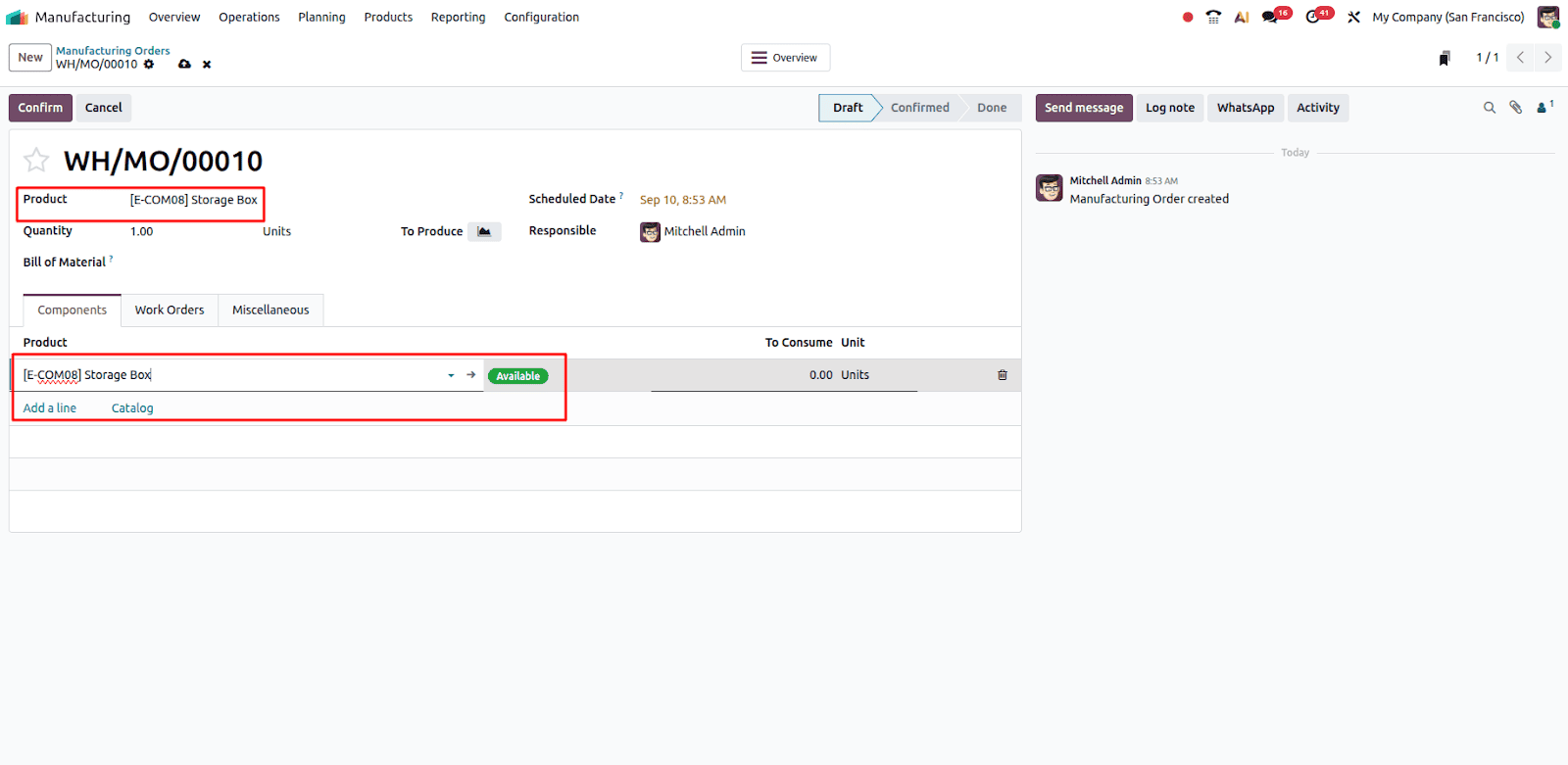
This feature allows manufacturers to reuse products efficiently, saving materials and reducing waste.
2. Flexible Work Order Status
Work order management in Odoo 19 is now more flexible, letting supervisors update statuses freely. You can move orders between stages like “To Do,” “In Progress,” or “Blocked” whenever needed, giving better control over production flow.
- Easily mark orders as “Blocked” if parts are missing and resume later.
- Provides real-time tracking of production progress.
Example: A supervisor can pause a work order until a missing component arrives and then continue without confusion.

Supervisors gain full control over production flow, improving flexibility and preventing delays.
3. Simplified Shop Floor Operations
The shop floor interface has been redesigned for clearer and faster workflows. Components are easier to pick, instructions are more visible, and workers can perform actions directly on the work order card.

- Reduces errors by allowing tasks to be updated directly on the interface.
- Speeds up operations with a clearer and more intuitive design.
Example: Workers can pick materials and mark tasks as completed without switching screens, making the process faster and smoother.
Workers can complete tasks faster and more accurately thanks to the streamlined interface.
4. Product-Specific Lot & Serial Numbers
Odoo 19 introduces product-specific lot and serial number sequences, making traceability much more precise. Each product can now have its own sequence, improving inventory tracking and quality control.
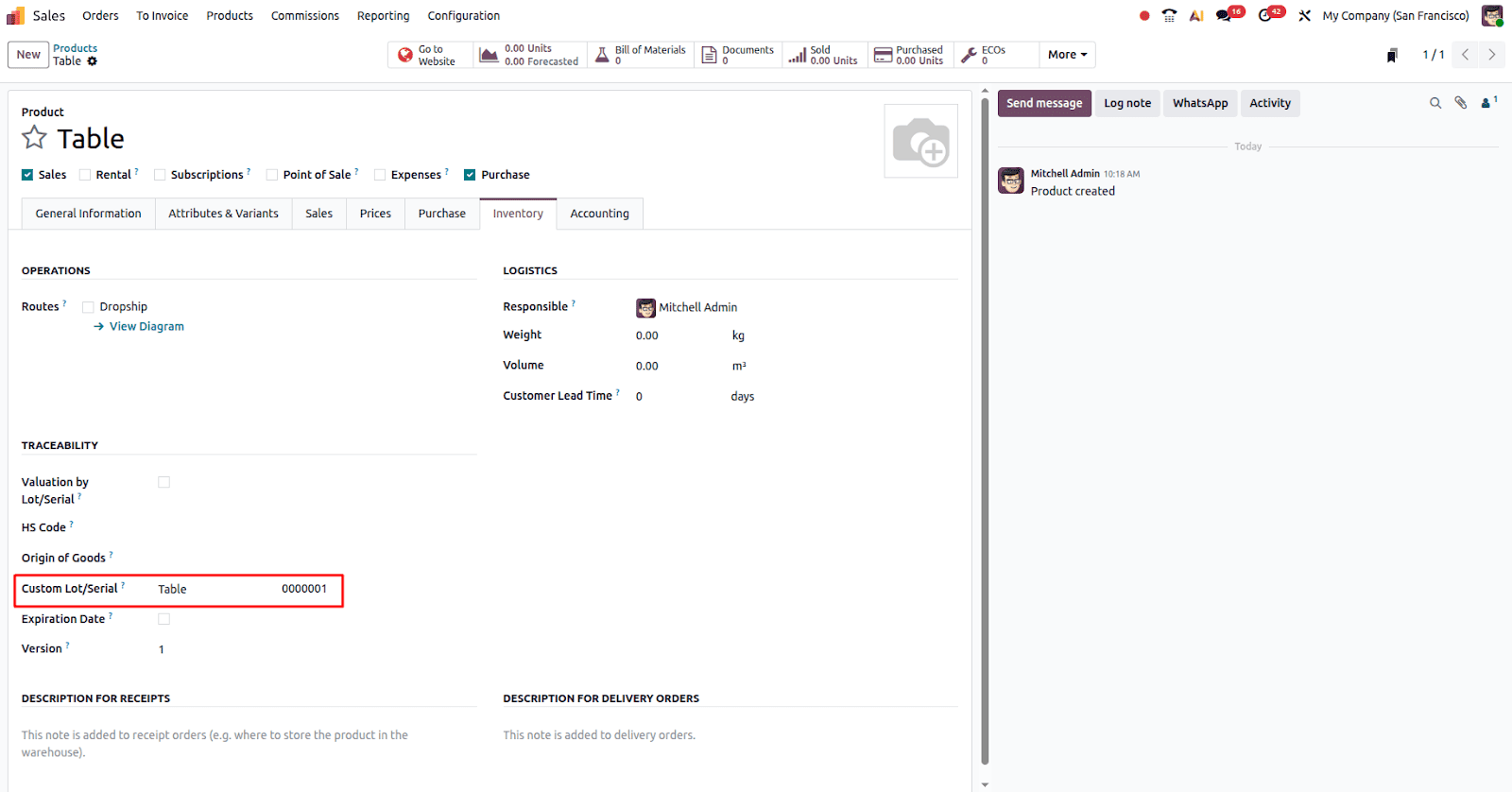
- Helps track individual products or batches accurately.
- Useful for audits, recalls, and quality checks.
Example: A manufacturer can trace each product batch or serial individually, ensuring better control over production and inventory.
Accurate tracking ensures better quality control and easier inventory management.
CRM & Marketing
Odoo 19 makes managing leads and customer interactions smarter and faster. From scanning business cards to improved analytics, the updates help sales and marketing teams work more efficiently and stay on top of communications.
1. Business Card Scanning
Odoo 19 makes capturing new leads from events or meetings faster and simpler. Instead of typing every contact manually, you can scan a business card using your mobile or web app, and a new lead is created instantly. This saves time and reduces the risk of errors.
- Odoo 18: All leads had to be entered manually from business cards, which was time-consuming.
- Odoo 19: Scanning automatically captures the contact information, including name, email, phone, and company details.
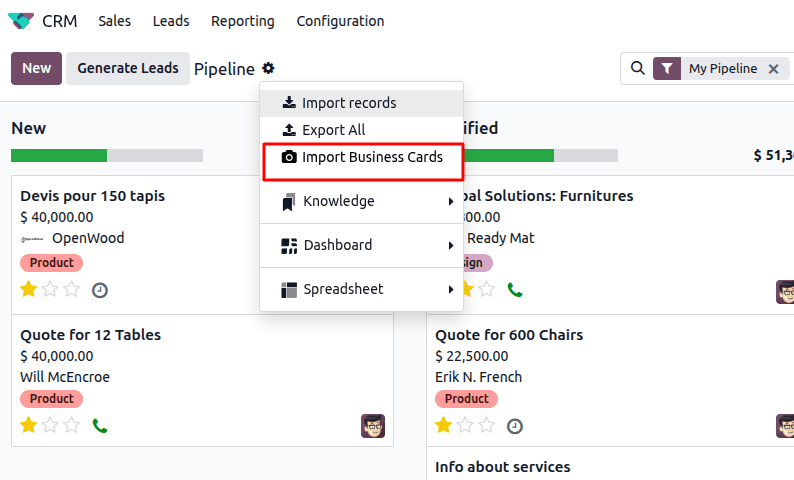
Example: At a trade show, a salesperson scans a visitor’s business card, and the lead appears in CRM immediately, ready for follow-up.
2. Customer Contact Properties
Odoo 19 allows you to add extra fields to customer records to store more complete contact information. This ensures consistency across sales and marketing workflows and helps your team communicate effectively.
- Odoo 18: Secondary contact details such as extra emails or phone numbers were not supported.
- Odoo 19: Extra fields can be added easily to store all relevant contact information in one place.
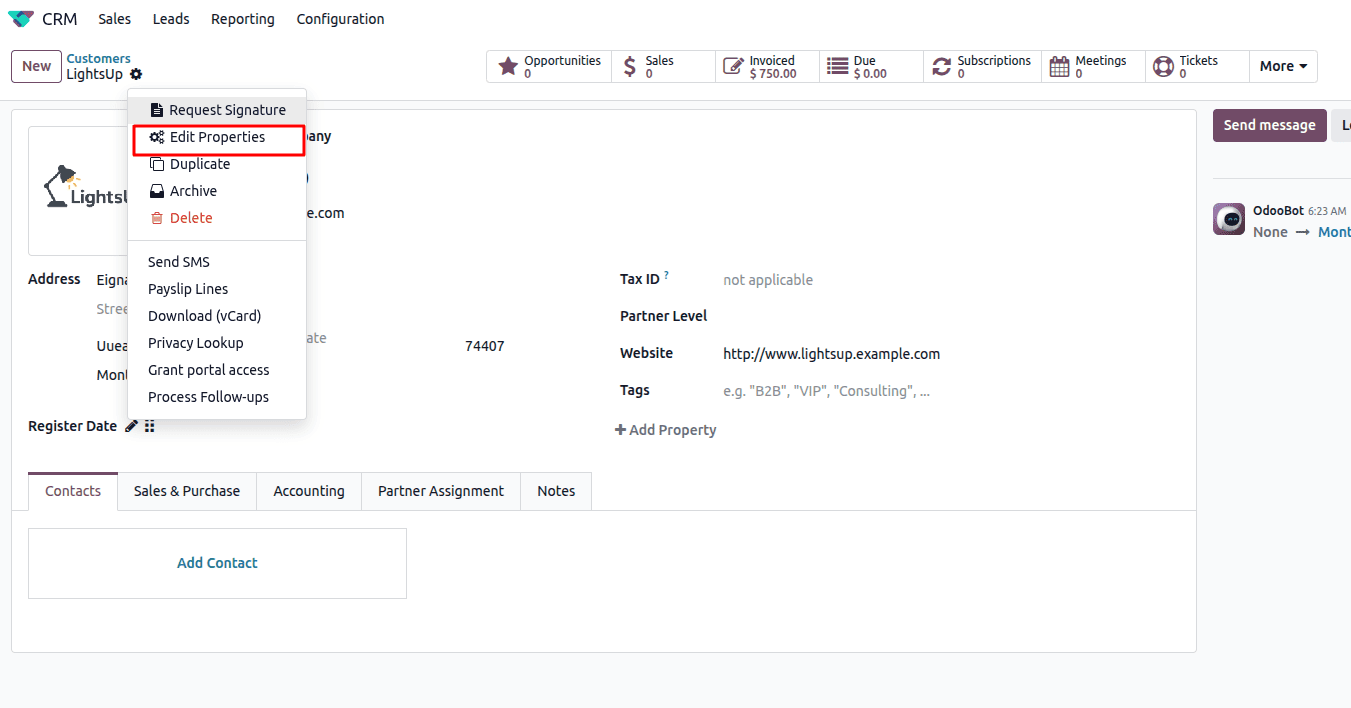
Example: A sales representative can add a secondary email or mobile number to a client record, so any important updates reach the right person without delay.
3. CC Replies in Chatter
Chatter in Odoo 19 now supports CC replies, improving collaboration across teams. This ensures that anyone included in CC stays informed and can participate in discussions directly within the chatter.

- Odoo 18: CC functionality was limited, and replies from CC’d users were not tracked properly.
- Odoo 19: Users included in CC can reply directly in chatter, making communication seamless and preventing missed updates.
Example: A project lead CC’d on a client discussion can respond immediately, and all team members see the update in real time.
4. Improved Win-Rate Analysis
Sales managers can now get deeper insights into lead performance and conversion rates. Odoo 19 introduces more detailed analytics, allowing you to track which campaigns and sales strategies are most effective.
- Odoo 18: Win-rate metrics were basic and limited to simple numbers.
- Odoo 19: Advanced analytics provide charts, trend analysis, and detailed conversion tracking.
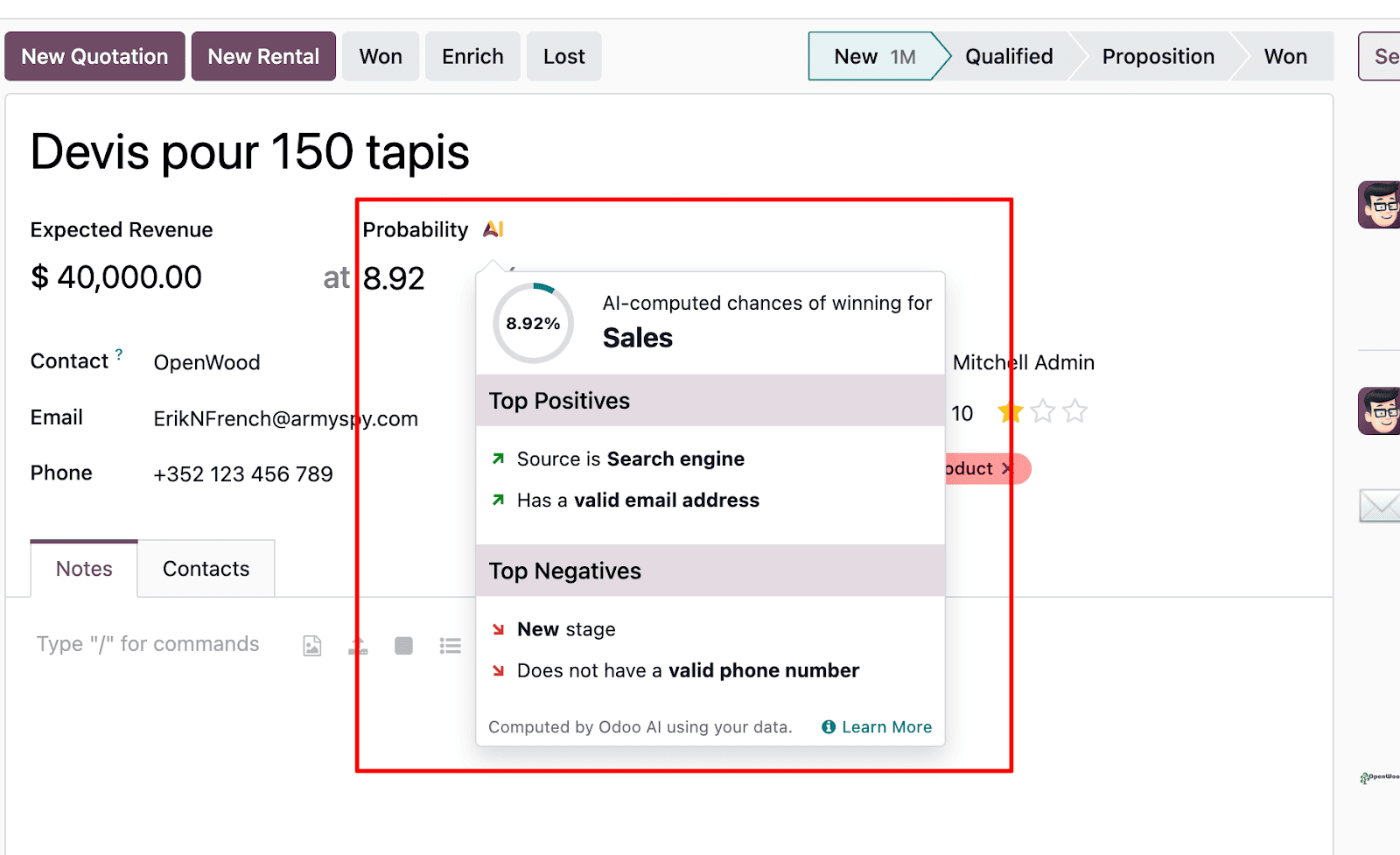
Example: A sales manager can quickly see that a specific email campaign converted 20% of leads into customers, helping adjust strategies for better results.
5. Overall Lead & Chatter Enhancements
Odoo 19 improves general lead management and chatter interface to make workflows smoother. Teams can collaborate more efficiently, and the interface is more intuitive, reducing the learning curve for new users.
- Odoo 18: Standard lead management with basic chatter interface.
- Odoo 19: Enhanced UI, faster workflows, and better integration of communication tools.
Example: A team can manage leads, share updates, and communicate directly in the system without switching between multiple apps, saving time and avoiding errors.
Odoo 19 CRM & Marketing simplifies lead capture, improves communication, and gives sales teams better tools to track performance and collaborate effectively.
Services
Odoo 19 makes managing projects and tasks easier and more structured. With project roles, task templates, and automatic scheduling, teams can stay organized and complete work more efficiently. Planning, helpdesk, field service, and to-do tasks are now simpler to manage, saving managers and employees time.
1. Project Roles
Project roles allow managers to assign responsibilities to team members when adding them to projects or tasks. This ensures that tasks are handled by the right people, reducing confusion and improving accountability.
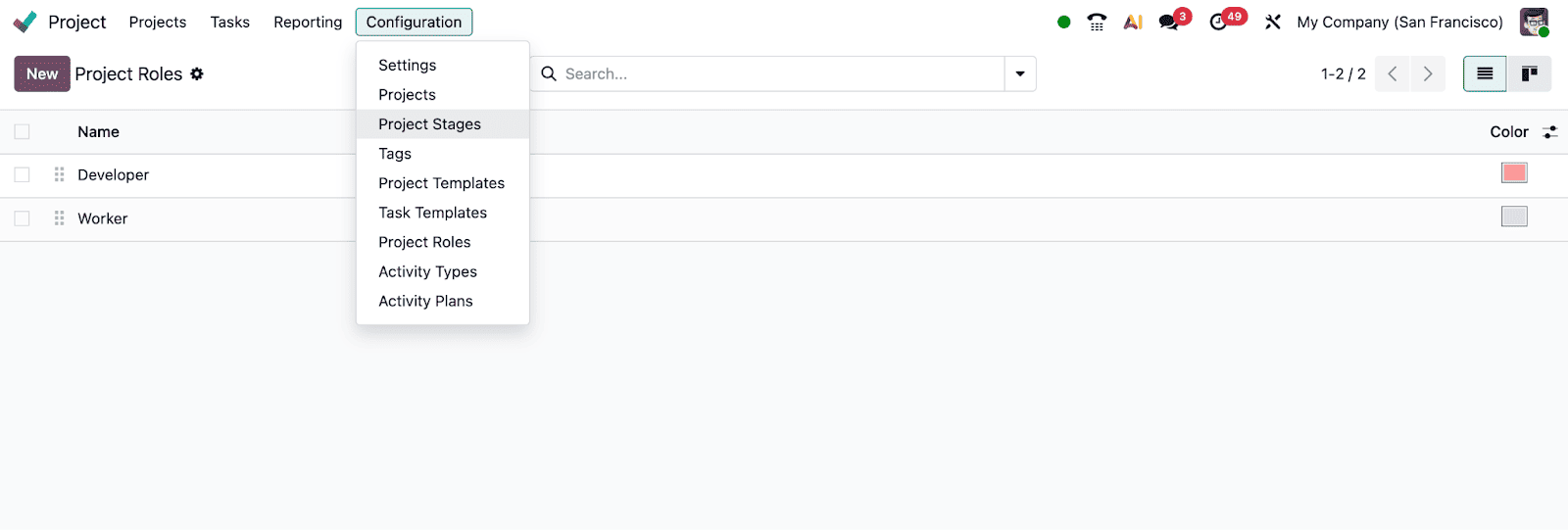
- Roles like “Designer,” “Developer,” “Reviewer,” or “Tester” can be defined and assigned directly in project or task templates.
- Automatically matches team members with tasks based on their roles and responsibilities.
- Improves clarity in large projects where multiple teams are involved.
Example: A project manager assigns a “Designer” role to a specific set of tasks, ensuring only designers can access and work on them.
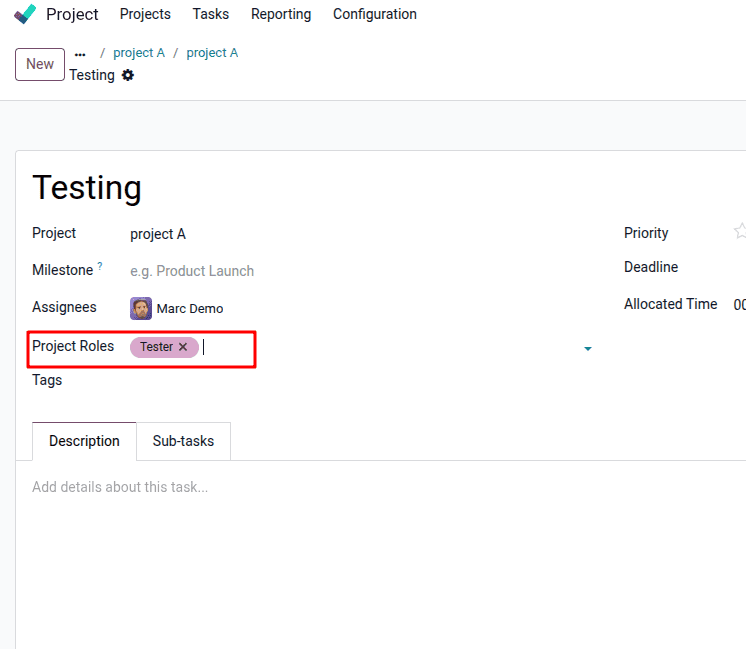
Role-based assignments provide structure and clarity, ensuring the right team members work on the right tasks.
2. Task Templates
Task templates simplify the creation of recurring or standard tasks by pre-defining details such as descriptions, deadlines, roles, and dependencies. This saves time, ensures consistency, and reduces the risk of missing important steps.
- Pre-configure all essential information for recurring tasks.
- Use templates across multiple projects to maintain uniform processes.
- Reduces repetitive work for project managers and team leads.
Example: A weekly marketing report can be generated from a template with pre-assigned roles, deadlines, and descriptions, eliminating the need to recreate it every week.

Task templates save time and help teams maintain consistent standards across projects.
3. Project Launch from Templates & Auto-Scheduling
Entire projects can now be created from pre-defined templates, with tasks automatically scheduled and assigned based on project roles. This feature helps maintain a consistent project structure while reducing manual setup time.
- Tasks are automatically allocated to the right team members according to their roles.
- Deadlines and dependencies are calculated automatically for a smooth workflow.
- Makes onboarding new projects faster and more organized.
Example: A marketing campaign can be launched from a template, automatically scheduling social media posts, content creation, and review tasks with the right team members assigned to each.
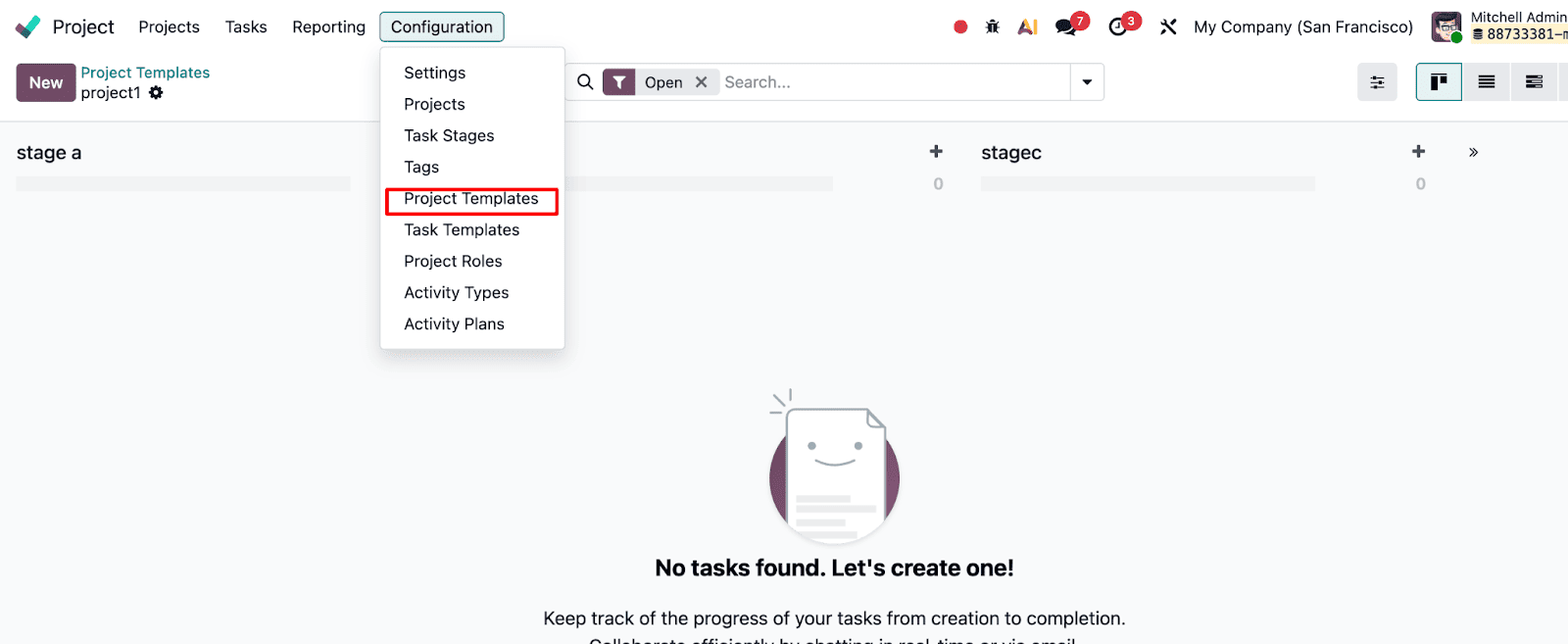
Automating project creation and task assignment saves time and ensures projects follow a consistent, organized structure.
4. Calendar Task Scheduling
Planning and rescheduling tasks is now much easier with a drag-and-drop calendar interface. Managers can move tasks around directly in the calendar without opening each task individually, making workload adjustments quick and visual.
- Visual overview of all tasks and deadlines across projects.
- Adjust task dates in real-time to respond to changes or delays.
- Helps balance workloads and prevent overlapping tasks.
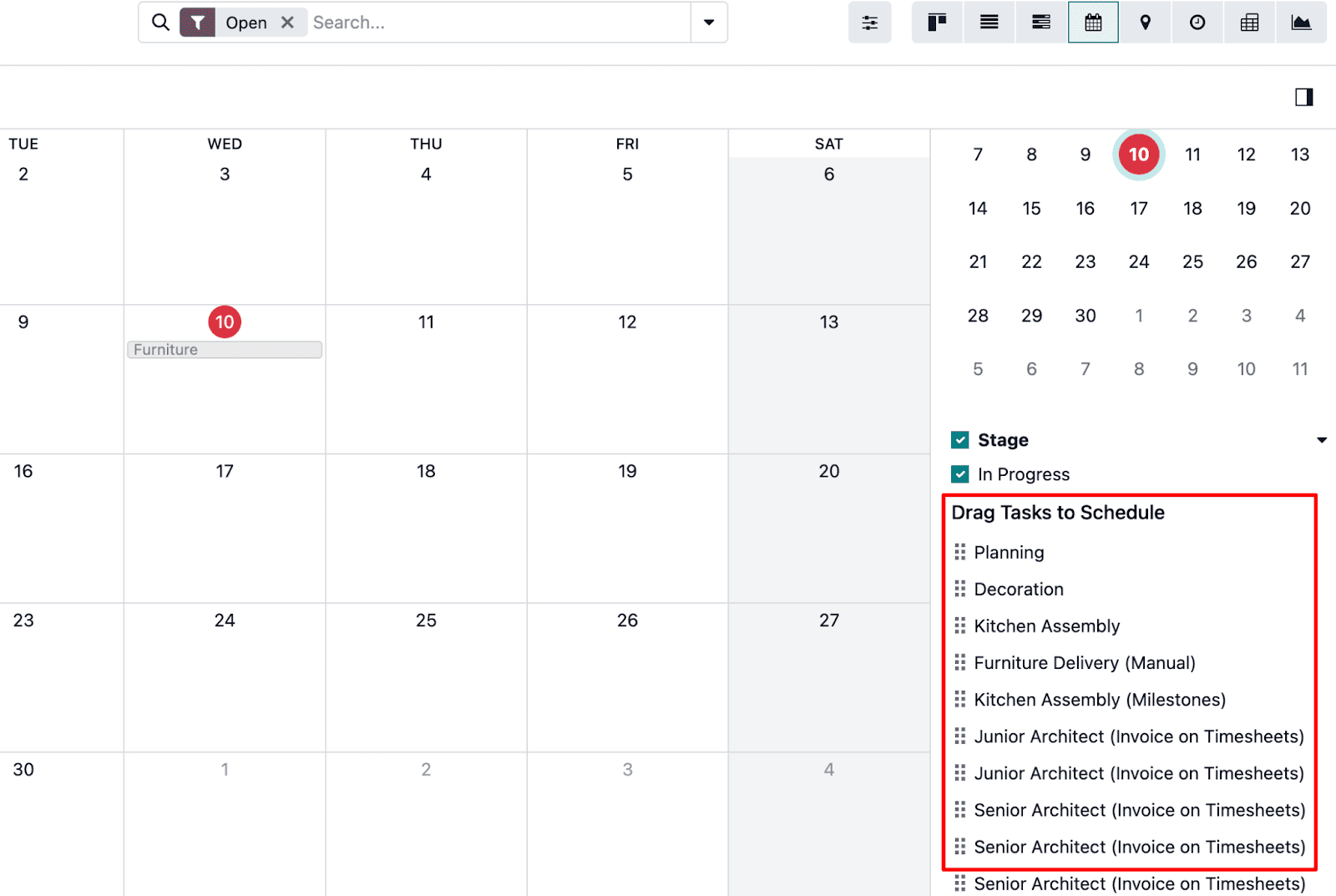
Example: A manager can quickly reschedule a development task from Monday to Wednesday by dragging it in the calendar, ensuring team members have sufficient time to complete previous tasks.
Calendar-based scheduling simplifies planning, improves flexibility, and ensures projects stay on track.
5. Subtasks More Clearly Visible
Subtasks are now easier to track, with a dedicated button to expand and view them under a main task. This gives project managers and team members clear visibility into smaller, dependent tasks that contribute to the main project goals.
- Instantly expand all subtasks under a main task to see pending and completed work.
- Improves monitoring of progress and helps avoid missed steps.
- Keeps teams aligned on what needs to be done.
Example: A main task like “Develop Feature X” can show subtasks for coding, testing, and review, allowing team members to complete them efficiently.
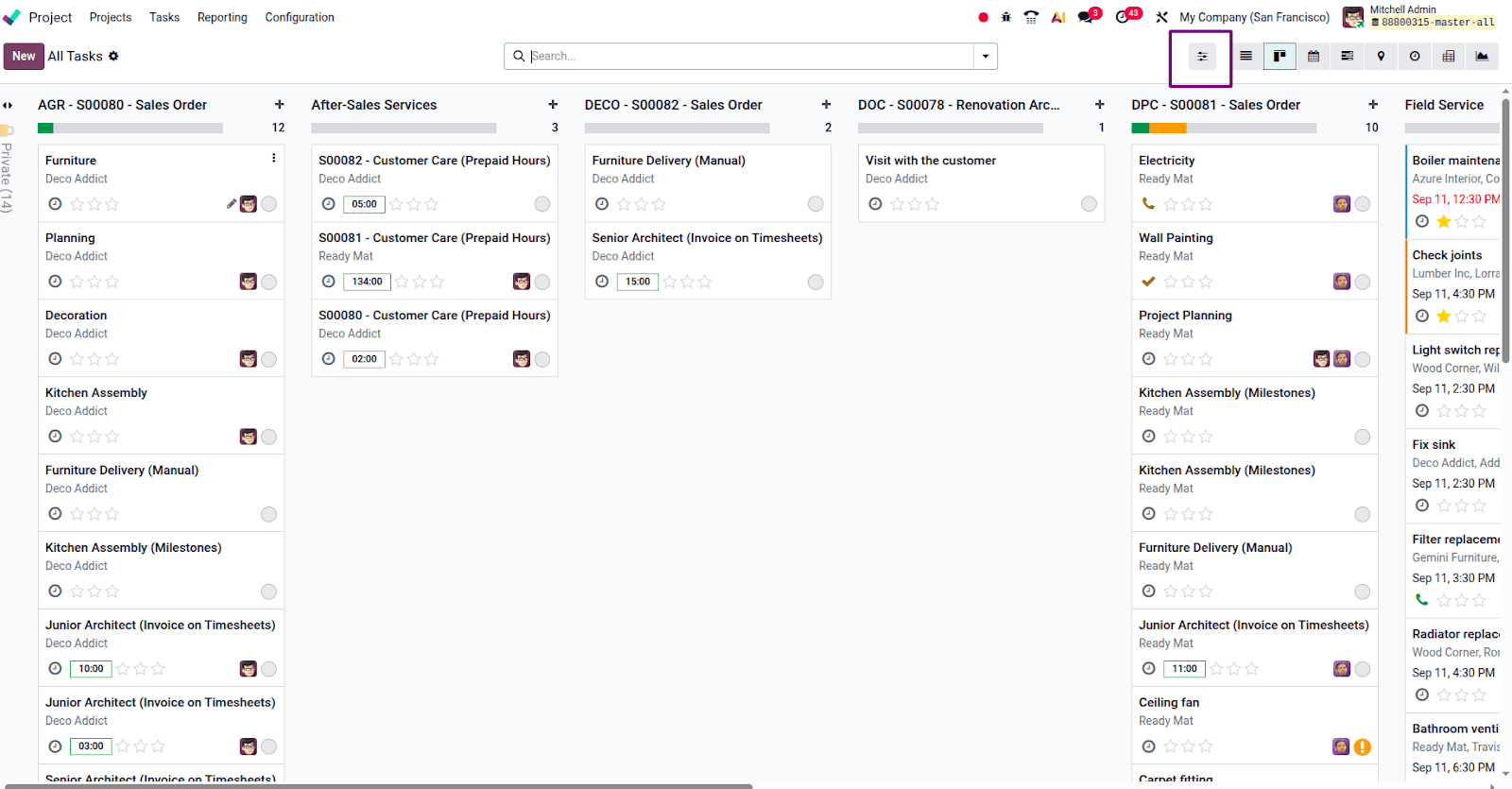
Enhanced subtask visibility improves workflow tracking, accountability, and ensures nothing is overlooked in project execution.
With Odoo 19, the Services module offers a smarter, more organized approach to project and task management. Role assignments, templates, auto-scheduling, calendar planning, and clearer subtasks make it easier for teams to collaborate, track progress, and complete projects efficiently.
Helpdesk
In Odoo 19, the Helpdesk app focuses on making customer service faster and more efficient. One of the biggest updates is the ability to handle product replacements directly from tickets, reducing manual steps and giving customers quicker solutions.
1. Replacements of Products Directly from Helpdesk
Customer support teams no longer need to switch between multiple apps to process product replacements. With Odoo 19, a new “Replace” button is added inside helpdesk tickets, allowing agents to generate a replacement order instantly.
- Support agents can create a replacement in one click without opening Sales or Inventory.
- Customers benefit from faster resolutions since their requests are processed immediately.
- Reduces errors and saves time for support staff by eliminating duplicate data entry.
Example: If a customer reports a defective phone through a helpdesk ticket, the agent can simply click “Replace” on that ticket. A replacement order is automatically created, and the customer gets their new phone without long back-and-forth communication.
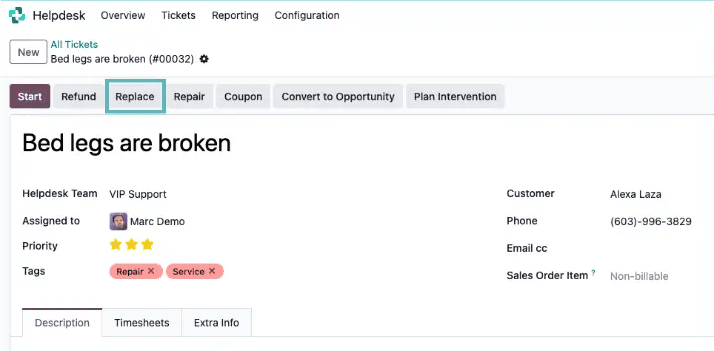
Direct replacements from helpdesk tickets make customer support smoother, ensuring quick resolutions and higher customer satisfaction.
ESG (Environmental, Social, and Governance)
Odoo 19 brings a new ESG app that helps businesses start tracking their impact on the environment and prepare for new rules like the Corporate Sustainability Reporting Directive (CSRD) in Europe.
Automated Emission Calculation
One of the main features is the automatic calculation of CO2 emissions. Odoo looks at your invoices and applies ready-made emission factors for common items such as electronics, fuel, or travel. This means you don’t have to enter data manually — the system does it for you.

Example: If your company buys a batch of laptops, Odoo will automatically add the estimated emissions from those laptops to your sustainability report.
Why is This Useful?
- Saves time: No need for manual tracking or separate spreadsheets.
- Compliance made easier: Helps companies get ready for stricter sustainability laws.
- Transparency: Shows employees, customers, and partners that your business cares about its environmental footprint.
The new ESG app in Odoo 19 makes it simple for any company to begin sustainability reporting. Even if you’re just starting, this tool gives you a strong foundation to measure, report, and improve your environmental impact.
Sign
In Odoo 19, the Sign app becomes more powerful and user-friendly. It now supports multi-document workflows, better tools for handling multiple signers, more flexible fields, and a refreshed interface. These changes make the signing process faster, smoother, and easier for both businesses and their clients.
1. Multi-Document Envelopes
Previously, each signing request could only contain one document. Now, Odoo allows you to group several documents together into a single “envelope.” This makes the process simpler for both the sender and the signer.
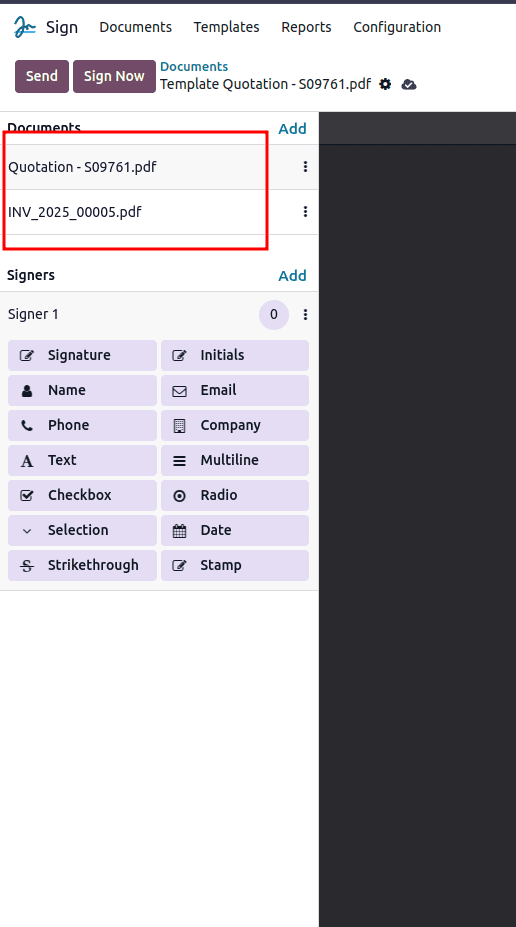
- No need to send multiple emails for different documents.
- Reduces the chances of a signer missing or forgetting an important file.
- Helps keep related documents organized in one package.
Multi-document envelopes create a smoother, all-in-one signing experience for both sides.2. Improved Multi-Signer Interface
Many agreements require multiple people to sign, for example, managers, partners, or stakeholders. In earlier versions, handling this was possible but sometimes confusing. Now, Odoo offers a redesigned, clearer interface that makes managing multiple signers much easier.
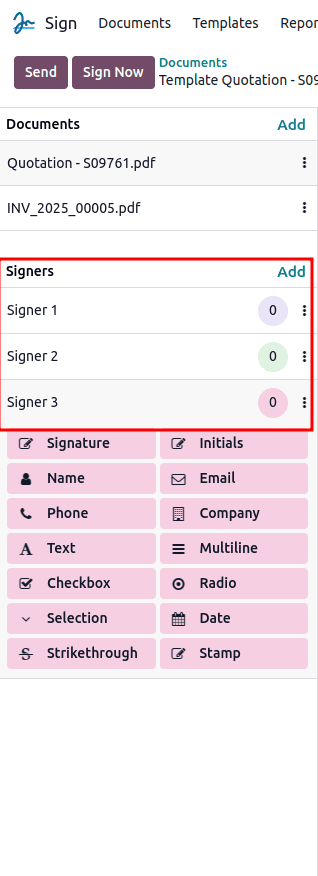
- Shows the full signing sequence in an organized layout.
- Provides real-time visibility of who has signed and who is pending.
- Reduces errors and confusion when multiple people are involved.
Example: For an investment agreement needing three stakeholder signatures, you can see the sequence and each signer’s status at a glance.
3. Customizable Field Types
Odoo expands beyond basic fields like signature, initials, and text. The Sign app now supports more interactive field types, giving businesses greater flexibility in document creation.
- Add checkboxes for selections or approvals.
- Use dropdown menus to let signers choose from options.
- Include rich text fields for detailed input.
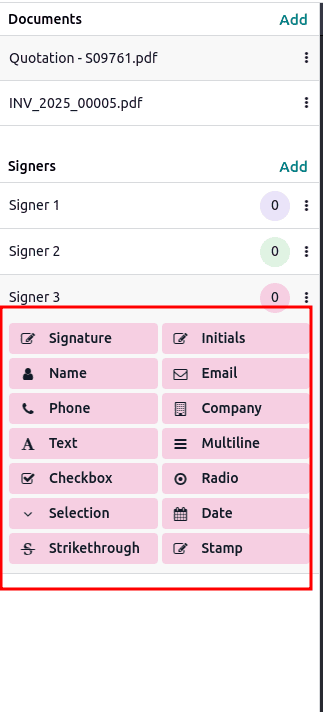
Example: HR can prepare an employee form where the new hire selects benefit options using checkboxes and chooses their department from a dropdown menu — all inside the document.
4. Modernized User Experience (UX)
A big part of this update is the fresh, streamlined interface. It not only looks modern but also helps users work faster.
- Fewer clicks are needed to prepare and send documents.
- A cleaner layout makes reviewing and signing more straightforward.
- The whole signing process feels faster and less complicated.
Example: A sales manager preparing a customer contract can now set up fields, arrange signers, and send the document in much less time compared to before.
The redesigned interface ensures a faster, smoother signing experience for everyone.
Together, these improvements make Odoo 19 Sign a complete solution for digital document signing — faster for businesses, easier for employees and partners, and more reliable overall.
IAP (In-App Purchases)
The IAP (In-App Purchases) services in Odoo are designed to extend the platform’s capabilities by connecting with external data and services.
In Odoo 19, IAP becomes even more powerful by introducing new integrations that focus on data accuracy, compliance, and communication efficiency. This ensures businesses can rely on verified information while saving time on manual data entry.
Dun & Bradstreet Integration
One of the key updates in Odoo 19 is the integration with Dun & Bradstreet (D&B), a globally recognized database of business information. With this feature, Odoo can automatically fetch and complete company details directly from D&B’s trusted records.
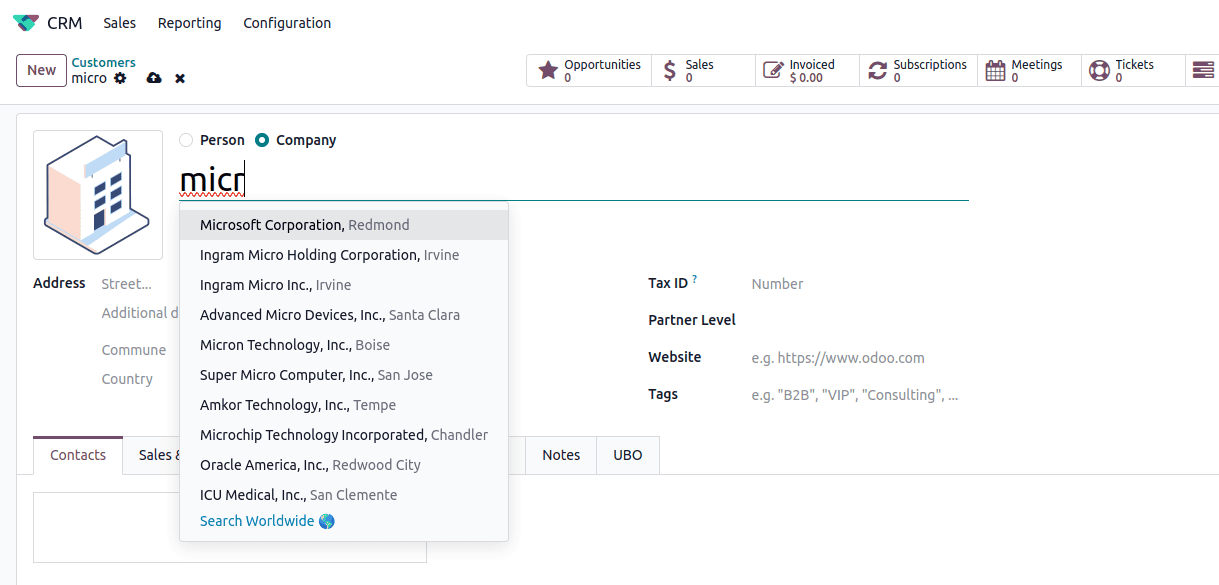
- Reduces the need for manual entry of company details.
- Ensures data accuracy by pulling verified information such as company name, address, and registration details.
- Helps businesses maintain compliance and avoid errors in their CRM records.
Example: A sales representative creating a new lead only needs to provide basic details. Odoo will then enrich the record with verified information from Dun & Bradstreet, making the process faster and more reliable.
This integration makes it easier for businesses to work with accurate and compliant data, minimizing the risk of mistakes and ensuring cleaner records across the system.
Documents
In Odoo 19, the Documents app has been improved to make storing, organizing, and managing files easier than before. The focus is on reducing setup time and giving users more flexibility to save and access documents where they need them. These changes help teams stay organized and work faster without dealing with unnecessary complexity.
1. Document settings simplified
Configuring documents is now much easier thanks to simplified settings and smart defaults. Instead of spending time adjusting multiple options, users can get started quickly with ready-to-use defaults.
- Fewer manual steps for setup.
- Defaults provided for quicker configuration.
- Easier onboarding for new users.
This change saves time and ensures teams can focus more on their actual work than on system setup.
2. Saving attachments in 'My Drive'
Another useful improvement is the ability to save attachments directly to your personal "My Drive" folder. Whether the file comes from a chat, a task, or another part of Odoo, you can now move it into your own Drive storage with just a click.
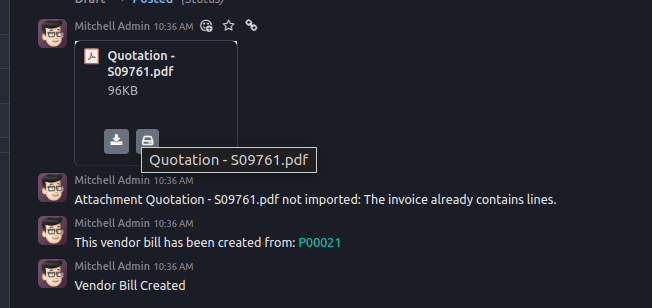
- Store attachments directly in your personal Drive.
- Keep important files separate from general folders.
- Access files later without digging through chats or tasks.
This feature helps users keep their important files neatly organized and always within reach.
AI
With Odoo 19, Artificial Intelligence is built directly into the platform, so businesses can use powerful automation and productivity tools without needing custom code or third-party integrations. From meetings to automation and content generation, AI is now part of daily workflows in Odoo.
1. Live Voice Transcript Summarisation
One of the most impactful additions is AI-powered meeting transcription. Users can record meetings and, once the recording is stopped, Odoo automatically generates a clear summary of the discussion. This means no more manual note-taking and ensures important points are never missed.
- Meetings are recorded directly within Odoo.
- Summaries and action points are created automatically.
- Saves time for teams and keeps discussions well-documented.
Example: After a project review meeting, Odoo instantly provides a summary with action items, which the team can use to move forward without spending extra time drafting notes.
This makes meetings more productive and ensures clarity for everyone involved.
2. AI Agents & Prompts
AI also plays a big role in automation and smart assistance across the platform. Instead of writing manual server actions or code, users can now rely on AI-powered prompts. AI agents can also assist directly in chatter, the email composer, and document editors, making everyday communication and setup more efficient.
- Automate actions using AI prompts instead of technical scripts.
- Create custom AI fields in Studio, such as generating product descriptions automatically.
- Get AI support in chatter, emails, and editors for drafting or summarising text.
Example: A user creating a new product can add an AI-powered field in Studio, which automatically generates a detailed product description from just the product features.
This allows teams to reduce repetitive work, improve accuracy, and move much faster without relying on technical skills.
Systemwide Improvements
Odoo 19 introduces several usability upgrades that improve workflows across the entire platform. These changes may look small at first, but they save time every day and make collaboration smoother for teams.
1. Online Status
Collaboration is easier when teammates know each other’s availability. With Odoo 19, users can set an online status such as “Available,” “Busy,” or “Do Not Disturb.” This ensures everyone understands when it’s a good time to reach out.
- Real-time availability indicators for all users.
- Helps teams avoid unnecessary interruptions.
- Makes communication more efficient.
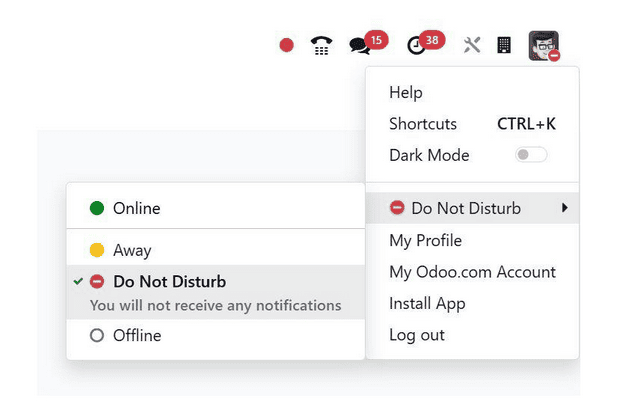
Example: An accountant can set their status to “Do Not Disturb” while finalizing reports, so colleagues know to message them later.
This simple feature encourages better focus and teamwork.
2. Contact Statistics
Odoo 19 also makes customer and partner data more transparent. Instead of checking multiple apps for information, users can now view key statistics directly from the Contacts app. This includes details like sales, invoices, and activities linked to each contact.

- Consolidated view of customer history and numbers.
- Saves time switching between modules.
- Offers quick insights for better decision-making.
Example: A salesperson can open a customer’s record and immediately see how much revenue that customer has generated, along with pending invoices.
This gives teams a complete picture without extra steps.
3. Activities
Managing activities is now much faster. Users can easily move, reschedule, or update activities from a single panel. This flexibility reduces clicks and makes task management less of a chore.

- Activities can be rescheduled in just one click.
- Clearer visibility of upcoming and overdue tasks.
- Smoother workflow for sales, support, and project teams.
Example: A sales rep preparing for follow-ups can quickly reschedule a call by dragging it in the activity panel, without opening the full task form.
This streamlines day-to-day work and helps ensure nothing slips through the cracks.
Framework
In Odoo 19, the framework has been upgraded to give users smarter planning tools, easier rights management, and smoother overall performance. These improvements make everyday system use faster and more reliable.
1. Calendar & Gantt Views
Planning and scheduling are now more flexible with improved calendar and Gantt tools.
- Bulk multi-edit allows managers to adjust several records at once.
- Zoom scaling and off-hour folding make schedules easier to view.
- Drag-to-resize provides quick changes without opening forms.
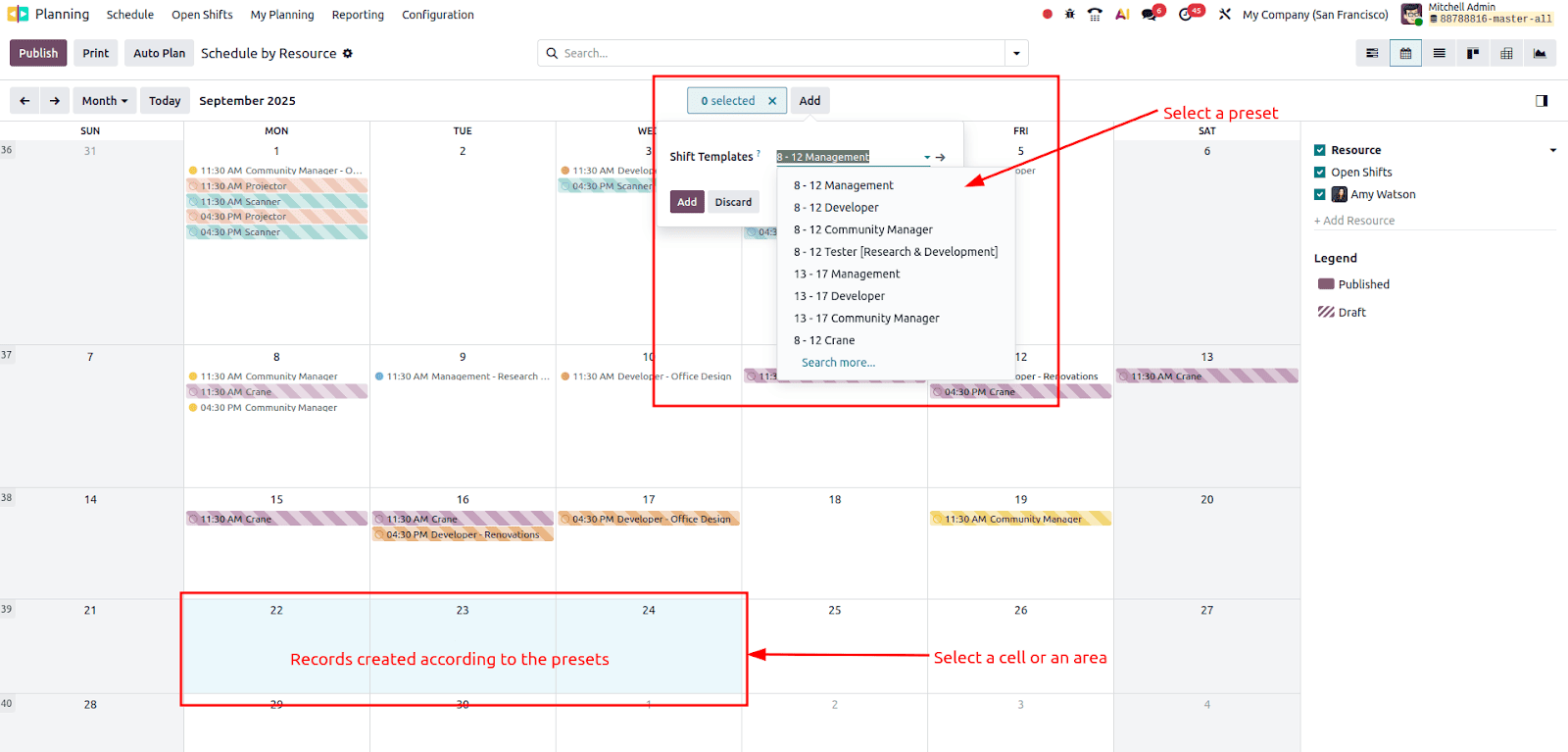
This makes planning simpler and more efficient for teams of any size.
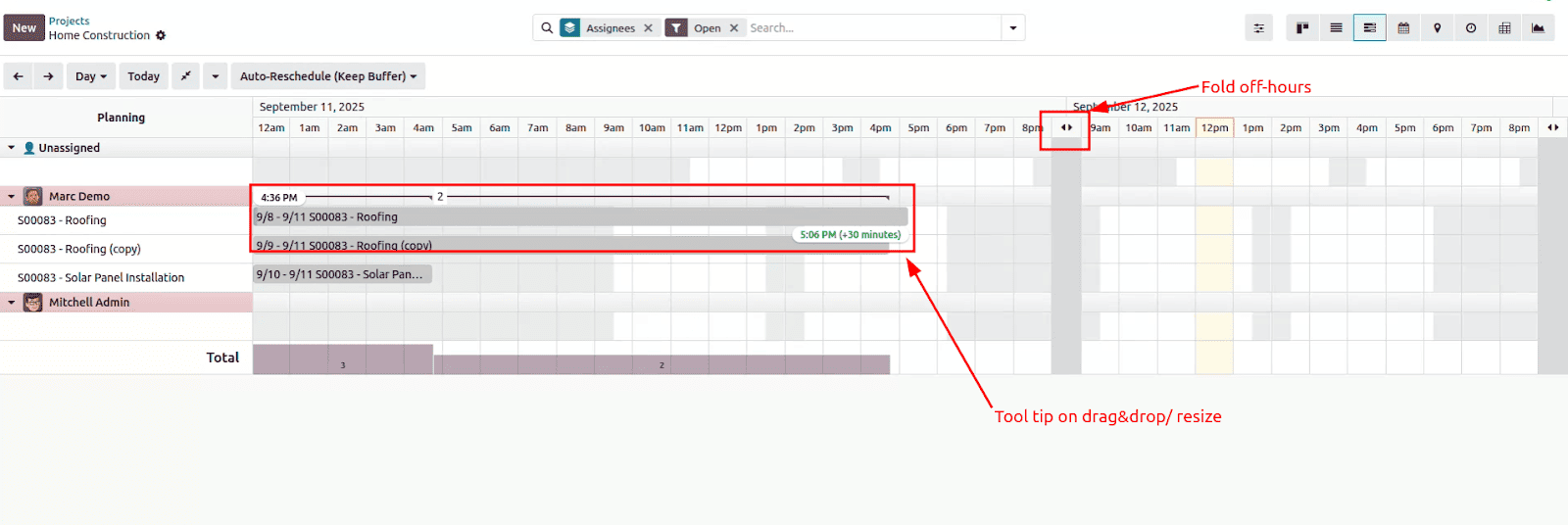
2. Access Rights
Managing user permissions has also been simplified for better security and control.
- Manual and implied groups are now clearly separated.
- Access rights and record rules are merged for easier setup.
- The “default user” setting is replaced by default access rights.
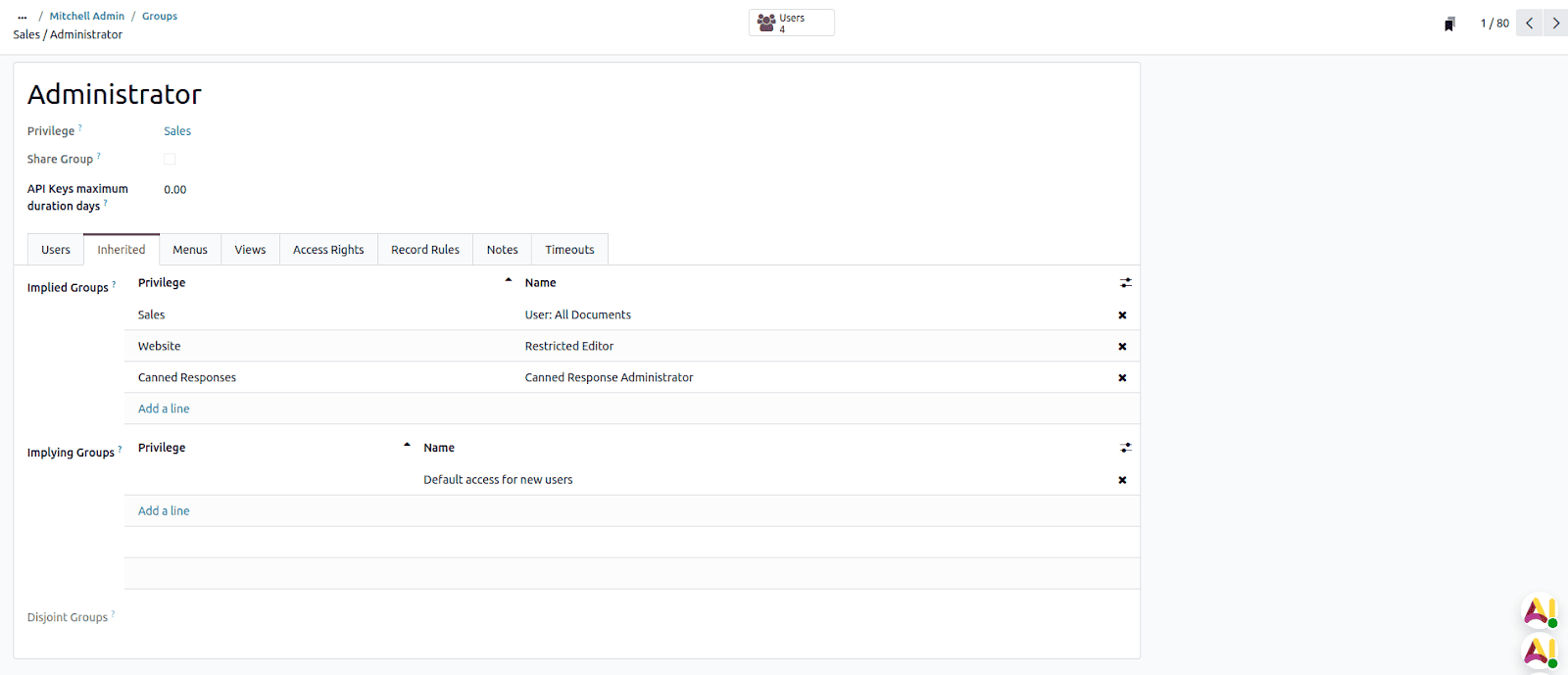
This ensures safer and more accurate role assignments across the system.
Discuss
In Odoo 19, Discuss is improved to give users more control over notifications, better team collaboration, and smarter automation for both internal chat and live chat.
1. Enhanced Notifications
Users now have finer control over when and how they receive notifications.
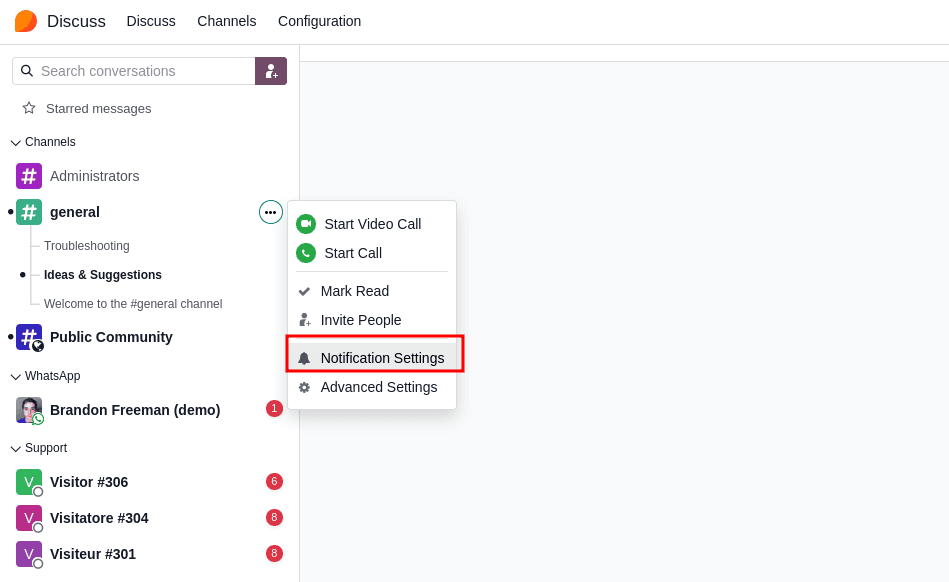
- Channels can be muted for specific hours.
- Notifications can be filtered by message type.
Example: A user can mute work-related pings after office hours while still receiving urgent alerts.
This helps reduce distractions and improve focus.
2. Role Mentions & Message Formatting
Communication in chatter is now more powerful with role mentions and rich text.

- Mention entire roles like @accounting or @sales instead of tagging one by one.
- Format messages with bold, italics, underline, or strikethrough for emphasis.

This makes team communication faster and clearer.
3. Smarter Bot Steps
Bots have become more intelligent in routing and automation.
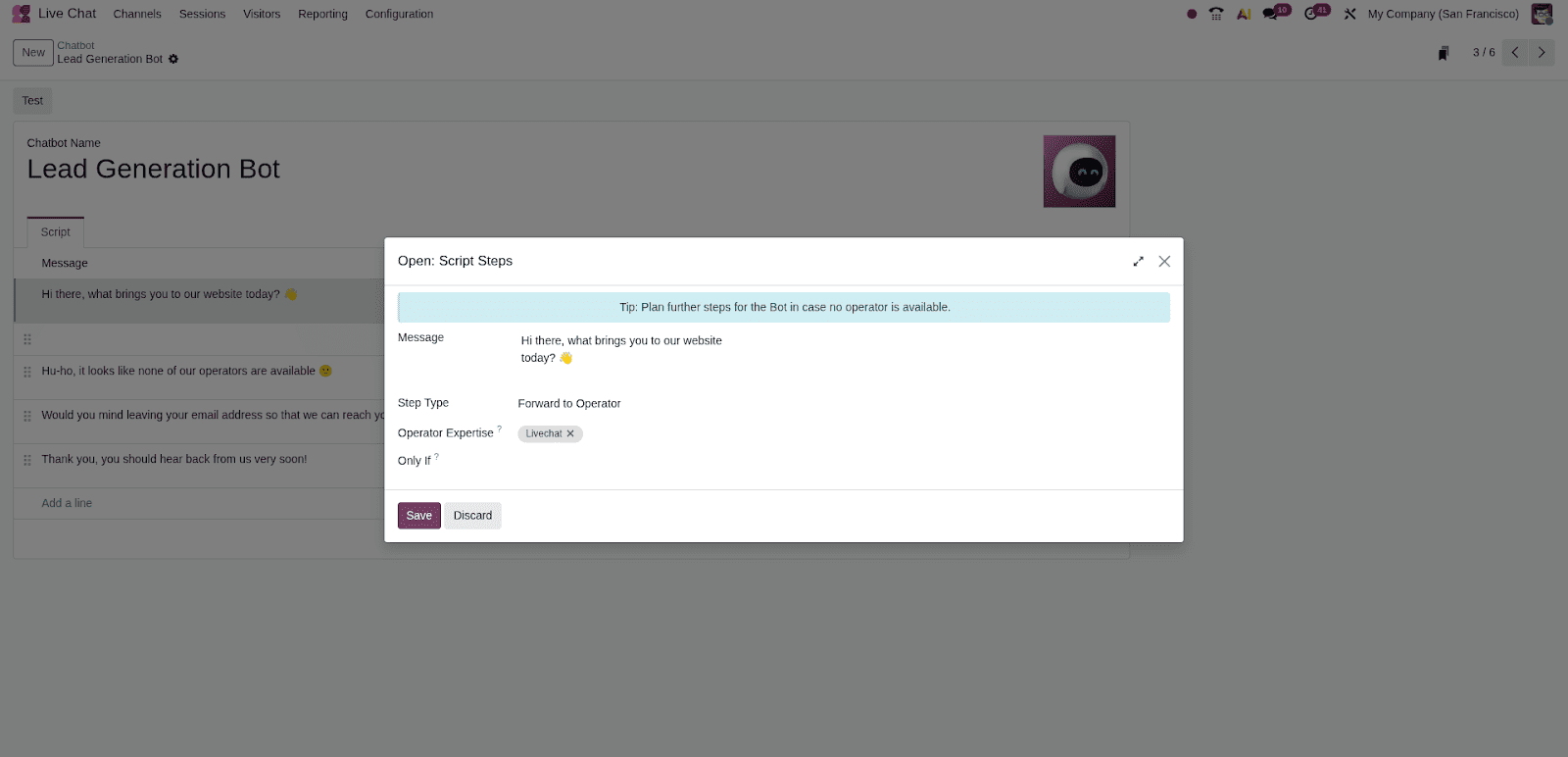
- Route chats based on expertise.
- Create leads automatically while forwarding to an agent.
Example: A customer asking about billing is directly sent to the finance expert, with a lead created for follow-up.
This reduces manual work and speeds up response time.
4. Other Key Enhancements
- Internal chat supports emoji shortcuts, call invite notifications, and time-off tracking.
- Live chat offers smarter routing by expertise, improved access control, session limits, and automatic ticket attachments.
These upgrades make Discuss not just a chat tool, but a smarter hub for both internal and customer communication.
VoIP
In Odoo 19, the VoIP app gets a big upgrade, making business calls smarter, easier to manage, and more productive. The improvements include live transcription, caller previews, a cleaner interface, and advanced call-handling options that give users more control during conversations.
1. Live Call Transcription
One of the most useful updates is automatic call transcription. After finishing a call, the system creates a written record of the conversation directly in the Calls form.
- No need to take notes during calls.
- Every detail is saved for reference and follow-up.
This feature ensures nothing is missed and helps teams stay aligned.
2. Caller Preview & Sleek Interface
The redesigned interface not only looks better but also provides caller details before the call is picked up.
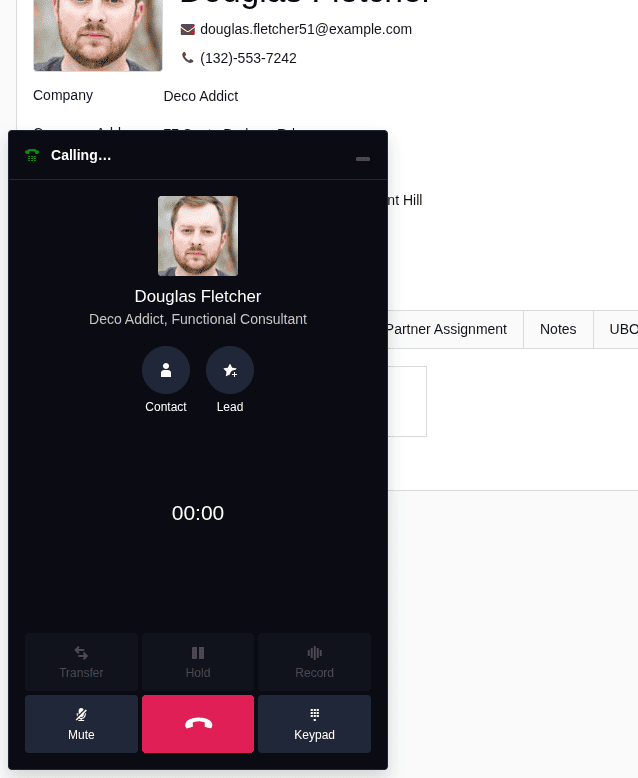
- Users can see who is calling in advance.
- The interface is smoother and easier to use, improving the overall experience.
This makes calls more professional and efficient.
3. Advanced Call Options
Odoo 19 also introduces new tools to handle calls more effectively.
- Directly transfer calls to the right person.
- Merge multiple calls into one conversation.
- Record calls for training, quality checks, or compliance.
Example: If two departments need to discuss with a client, an agent can merge the calls instantly instead of juggling between them.
These options make VoIP more flexible and suited for real-world business needs.
Knowledge
In Odoo 19, the Knowledge app becomes more structured and user-friendly. It introduces reusable templates for faster article creation and foldable toggles for better content organization. These updates make it easier for teams to keep information clear, consistent, and accessible.
1. Reusable Article Templates
Creating the same type of articles repeatedly can be time-consuming. Odoo 19 solves this by letting users build templates that can be reused anytime.
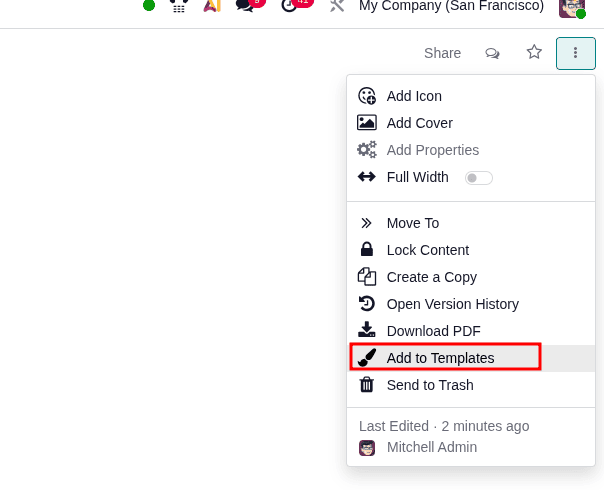
- Templates save time by avoiding repetitive formatting.
- They also ensure all articles look consistent across the knowledge base.
Example: A company can create an FAQ template once and then reuse it to quickly publish multiple support articles with the same structure.
This makes content creation faster and more professional.
2. Foldable Toggles via Slash Commands
With foldable toggles, content can be collapsed or expanded, making articles easier to read and navigate.
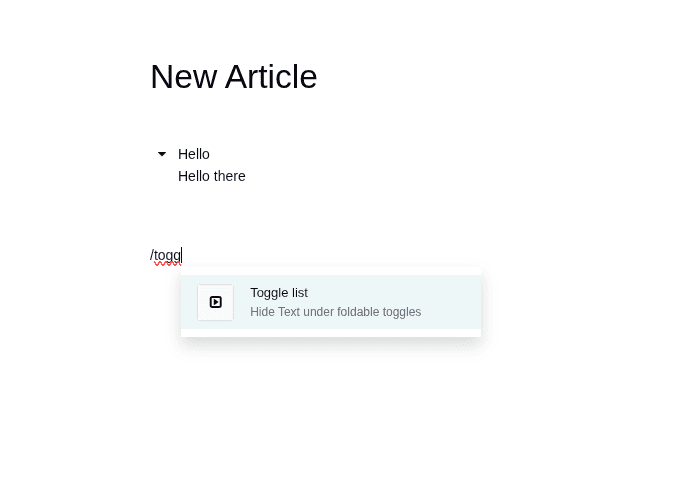
- Toggles are inserted quickly with simple slash commands.
- Readers can expand sections only when needed, reducing clutter.
Example: A knowledge base article on software setup can include collapsible sections for “Installation,” “Configuration,” and “Troubleshooting,” so readers open only the part they need.
This keeps articles neat and improves the reader’s experience.
Equity
In Odoo 19, the new Equity app centralizes shareholder and ownership management, replacing manual spreadsheets with a clear, automated system.
- Track Shareholders & Ownership: Register shareholders and keep ownership records in Odoo. Example: A startup adds founders and investors with their shares.
- Issue New Shares : Allocate shares directly without spreadsheets. Example: A company records new investor allocations in one step.
- Manage Stock Options: Assign and track employee stock options with vesting. Example: An employee’s 1,000 stock options are tracked automatically.
- Maintain Cap Table: Ownership percentages update instantly after each change. Example: Management sees the updated cap table after a funding round.
Conclusion
Odoo 19 brings major improvements across the platform, offering faster workflows, smarter automation, and better collaboration. From enhanced design and editing tools to AI-driven assistance, streamlined management of employees, finances, and documents, and improved communication features, Odoo 19 unifies business operations, making every department work more efficiently and effectively in a single, modern system.
To read more about What are the Expected Features in Odoo 19 ERP Software, refer to our blog What are the Expected Features in Odoo 19 ERP Software.